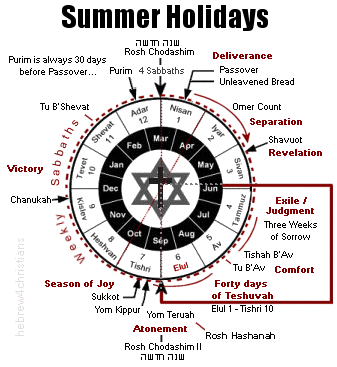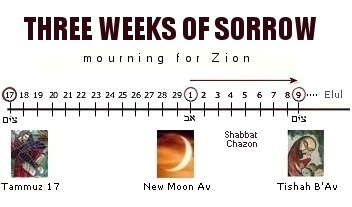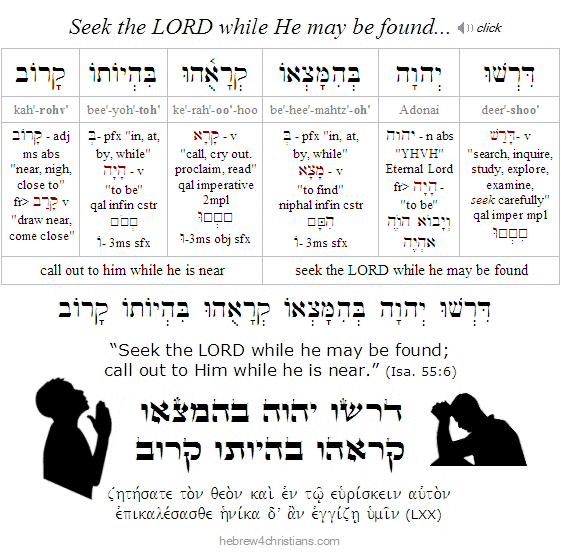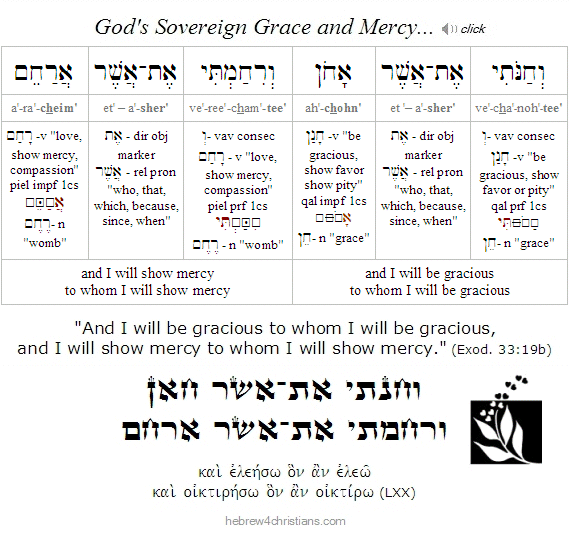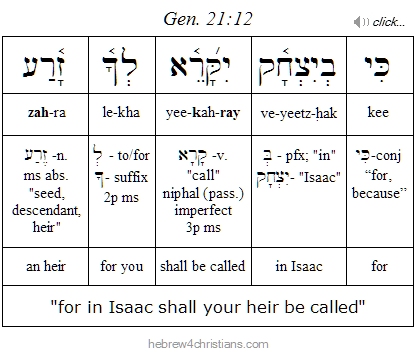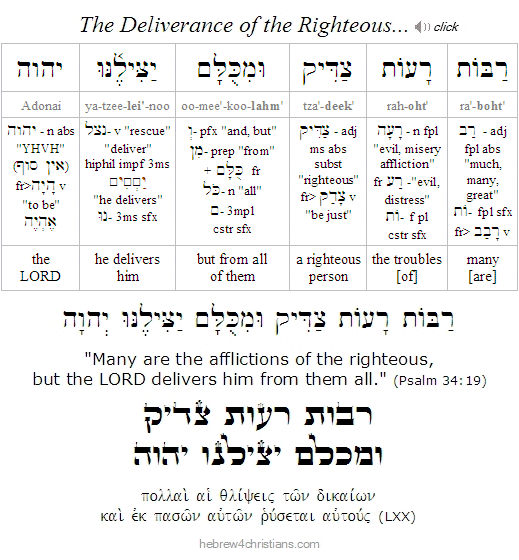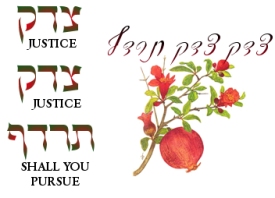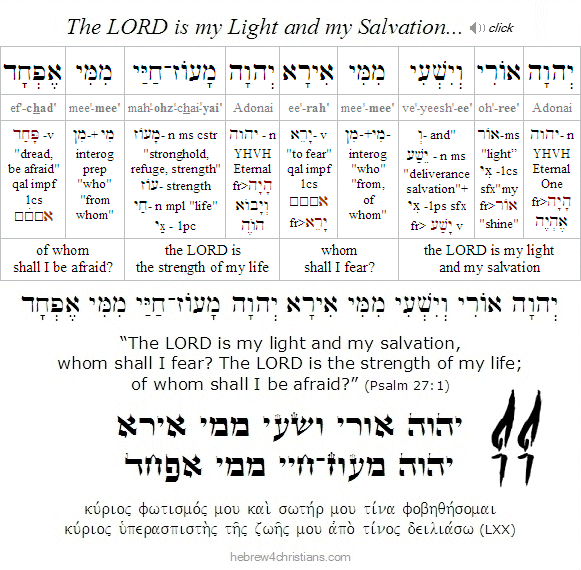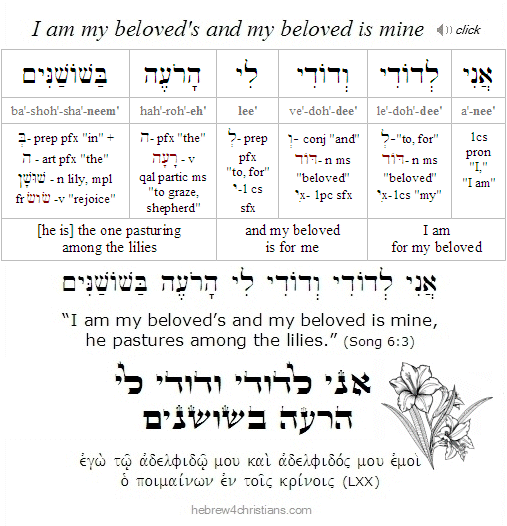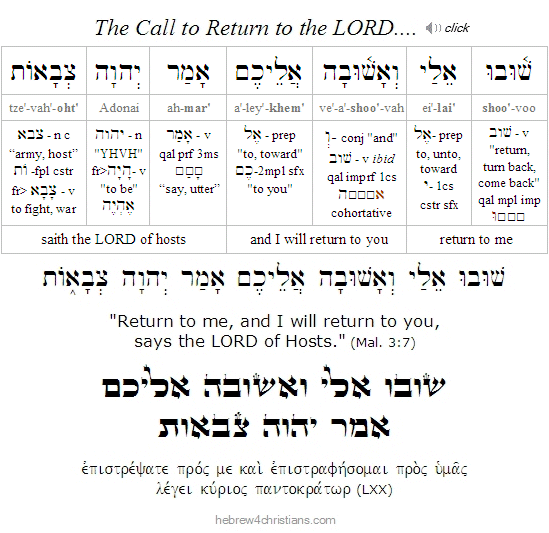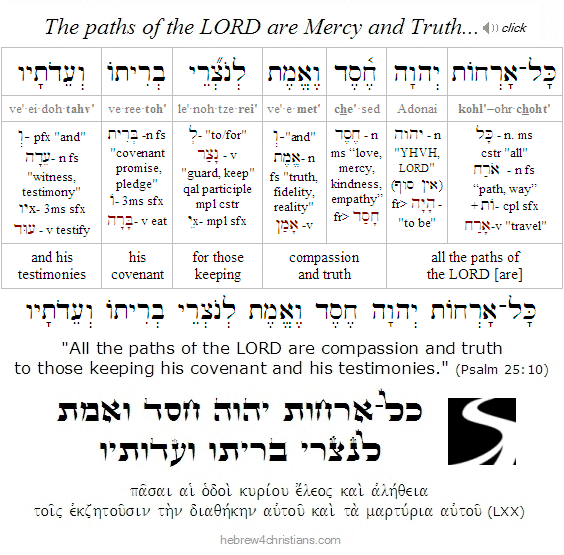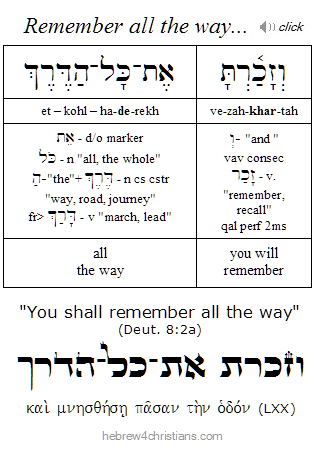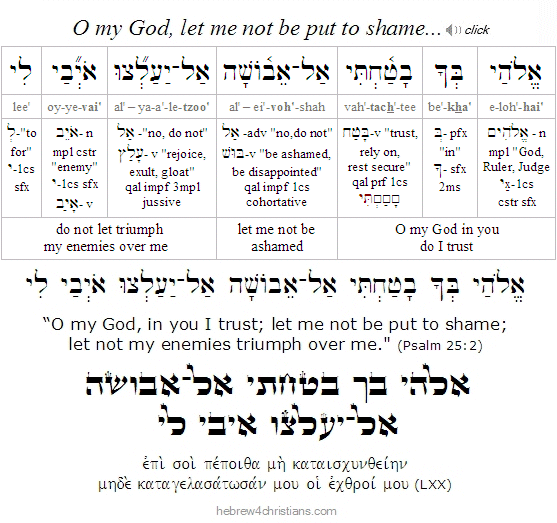|
Jewish Holiday Calendar
For August 2018 site updates, please scroll past this entry....
In the summer there occurs a three week period of mourning that begins with the Fast of Tammuz and ends with Tishah B'Av. The last nine days of this three week period (i.e., from Av 1 until Av 9th) are days of increased mourning. However, after this somber time, the romantic holiday of Tu B'Av, the 15th of Av occurs. Summer ends with the 30 days of the month of Elul, a yearly season of teshuvah (repentance) that anticipates Rosh Hashanah and the fall holidays. The 30 days of Elul are combined with the first 10 days of the month of Tishri to create the "Forty Days of Teshuvah" that culminate with Yom Kippur.
Because they occur between the spring and fall holidays, the summer holidays help us prepare for the second coming of the Messiah:
The Summer Holidays:

Note that in accordance with tradition, holiday dates begin at sundown. Moreover, some holidays may be postponed one day if they happen to fall on the weekly Sabbath:
- Month of Tammuz (Tues., June 12th [eve] - Thurs. July 12th [day])
- Month of Av (Thurs. July 12th [eve] - Fri. Aug. 10th [day])
- Month of Elul (Fri. Aug. 10th [eve] - Sun. Sept. 9th [day])
- Month of Tishri (Sun. Sept. 9th [eve] - Mon. Oct. 8th [day])
Note: For more about the dates of these holidays see the Calendar pages....
August 2018 Updates
Note: If any page content appears to be missing, click: refresh the page...
The Long Road Home...
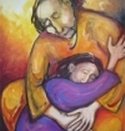
08.31.18 (Elul 20, 5778) Teshuvah ("repentance") is often described as "turning" back to God, though practically speaking it is an ongoing turning, that is, a turning to God both in moments of ambiguity, pain, and distress, as well as in moments of respite and relative happiness... It is in the midst of the ego's clamor, before the parade of worldly desire or pressure, in the crucible of "everydayness" that we must "come to ourselves" and find true wonder. In that sense, teshuvah is a sort of focus, a direction, a seeking, and a center of life, the place of constant repair for the inner breach we constantly feel. It's a long road home to finally understand you belong at your Father's table...
The question may be asked, however, whether you really want God - the Living God - to be intimately present in your life. "Repentance means unlearning all the self-conceit and self-will that we have been training ourselves into... It means killing part of yourself, undergoing a kind of death" (C.S. Lewis). Indeed, "nothing is more certain: coming close to God brings certain catastrophe [to the ego]. Everyone whose life does not bring relative catastrophe has never even once turned as a single individual to God; it is just as impossible as it is to touch the conductors of a generator without getting a shock" (Soren Kierkegaard).
It is written in the mishnah (Avot:15b), "repent one day before you die," but who knows the day of one's death in advance? Therefore "seek the LORD while he may be found; call upon him when he is near" (Isa. 55:6). "In eternity you will not be asked how large a fortune you are leaving behind - the survivors ask about that. Nor will you be asked about how many battles you won, about how sagacious you were, how powerful your influence - that, after all, becomes your reputation for posterity. No, eternity will not ask about what worldly goods remain behind you, but about what riches you have gathered in heaven. It will ask you about how often you have conquered your own thought, about what control you have exercised over yourself or whether you have been a slave, about how often you have mastered yourself in self-denial or whether you have never done so" (Kierkegaard).
Just as God humbled Israel with manna in the desert, so He humbles us. "Give us this day our daily bread and deliver us..." The purpose of affliction is ultimately good and healing: God humbles us with manna, the "bread of affliction, so "that he might make you know that man does not live by bread alone, but man lives by every word that comes from the mouth of the LORD" (Deut. 8:3). In other words, God uses tzuris to lead us to do teshuvah and accept the truth. We often pray that our problems be taken away, but God sometimes ordains these very problems so that we will turn and draw near to Him... We are being weaned from this present age to be made ready for heavenly glory, for things unimaginably wonderful, soon to be revealed to you. Chazak – stay strong in the Lord, friends.
Shabbat Shalom and love to you, friend...
Sanctifying the Truth...

08.31.18 (Elul 20, 5778) How do we share the message of God with others? How do we reveal the truth of Messiah in this world? In other words, how may the Spirit of God be manifest within us? The Scriptures say first to "sanctify the Messiah" within our hearts and then we will be ready to give a reason for our hope -- though we must do so in humility and reverence before heaven" (1 Pet. 3:15). Note here that the apostle mentioned a repeated theme in the Torah, namely, to "sanctify the LORD your God" (see Deut. 5:12; Deut. 14:2; Lev. 11:44; Lev. 19:2; Lev. 20:7, etc.), and applied this directly to Yeshua the Savior (i.e., the ancient text reads: κύριον δὲ τὸν Χριστὸν ἁγιάσατε ἐν ταῖς καρδίαις ὑμῶν). Here the Spirit recalls the words of Isaiah the prophet: "Sanctify the LORD of hosts (יְהוָה צְבָאוֹת); let him be your honor (yirah) and let him be your awe" (Isa. 8:3). We sanctify the Lord by choosing to make sacred place for him within our consciousness; we enshrine him and make him beautiful within our affections and actions (Exod. 15:2). When God said to his people, "Let them make for me a sacred place (i.e., mikdash: מִקְדָּשׁ) that I may dwell in their midst," then, he was inviting them to make room within their hearts (בְּתוֹכָם) for His Presence to be revealed (Exod. 25:8). King David understood this principle: "I have set the LORD always before me..." (Psalm 16:8). In other words we must open our eyes to see; we must humble ourselves to believe; and we must open our hearts before the greatness of God. This is the first step, as Yeshua taught us: Avinu shebashamayim, yitkadash shemekha - "Our Father in heaven, let your Name be sanctified" (Matt. 6:9). As we sanctify the Lord our God, we become sanctified ourselves, we bear withness of the truth of Reality, and the Spirit of God will empower us to living signs of the Divine Presence. "But the fruit of the Spirit (פְּרִי הָרוּחַ) is love, joy, peace, patience, kindness... (Gal. 5:22-23).
"Know therefore this day and lay it to your heart, that the LORD is God in heaven above and on the earth beneath; there is no other" (Deut. 4:39). Note that the phrase "lay it to your heart" may better be rendered as "return to your heart" (וַהֲשֵׁבתָ אֶל־לְבָבֶךָ), suggesting that the truth of the LORD is found there – within the heart that truly seeks him (Deut. 4:29). Hashivenu! In other words, the truth is found in the heart's seeking for the LORD and His love. Know this truth today... "The most important part of teaching is to teach what it is to know," that is, to know "in your heart."
Note: For more on this subject see the article: "The Fruit of the Spirit."
Miraculous Transformations...
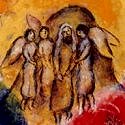
[ The following entry concerns this week's Torah reading, parashat Ki Tavo... ]
08.31.18 (Elul 20, 5778) From our Torah portion this week (i.e., Ki Tavo) we read: "You are a treasured possession ... a people holy to the LORD your God " (Deut. 26:18-19). Holiness, or kedushah (קְדוּשָׁה), represents transformation, being wholly set apart and turned toward the sacred, the Divine Presence. The LORD said to Moses from the midst of the shining flame: "Take off your sandals from your feet, for the place on which you stand is holy" (Exod. 3:5). The Chofetz Chaim comments: "By faith see that this place, right now, is holy ground, and awaits your response." Amen, and may we open our eyes to God's light:
קָדוֹשׁ קָדוֹשׁ קָדוֹשׁ יהוה צְבָאוֹת
מְלא כָל־הָאָרֶץ כְּבוֹדוֹ
ka·dosh ka·dosh ka·dosh, Adonai Tze·va·ot,
me·lo khol ha·a·retz ke·vo·do

"Holy, holy, holy is the LORD of hosts;
the whole earth is full of his glory!"
(Isa. 6:3)

Download Study Card
Spiritually speaking, the very first step is to find hope... The Divine Light is seen by means of the eye of faith (עַיִן שֶׁל אֱמוּנָה), as it is written, "Light dawns in the darkness for the upright; He is gracious, merciful, and righteous" (Psalm 112:4). Therefore we find life by trusting in God's Presence, even as we learn to see the invisible (2 Cor. 4:18; 5:7). "Trust in the LORD with all your heart, and do not lean on your own understanding. Know Him in all your ways, and He will straighten your paths. Be not wise in your own eyes; fear the LORD, and turn away from evil" (Prov. 3:5-7). Shabbat Shalom, dear friend...
An Ever-Present Mercy...
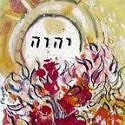
08.31.18 (Elul 20, 5778) Since Rosh Hashanah is known as the "Day of Judgment" (i.e., yom ha'din: יום הדין), it is customary to offer additional prayers of supplication (selichot) before the advent of the holiday. These prayers appeal to God's compassion and often include the recitation of "shelosh esrei middot rachamim," that is, the thirteen attributes of God's mercy (Exod. 34:6-7). The thirteen attributes reveal the inner meaning of God's Name YHVH (יהוה) that was disclosed to Moses after the people had committed the dreadful sin of the worshiping the golden calf at Sinai. God is not only our Judge and Lawgiver (Elohim), but our Savior and our Healer (Moshia). In his great mercy He restores what we have broken; He overcomes our jugdment by means of his abounding love given to us in Yeshua (Psalm 85:10). We therefore appeal to YHVH as the Source of Compassion, the "breath of life" (נִשְׁמַת חַיִּים) that was imparted to Adam on the day he was first created (Gen. 2:7).
יְהוָה יְהוָה אֵל רַחוּם וְחַנּוּן
אֶרֶךְ אַפַּיִם וְרַב־חֶסֶד וֶאֱמֶת
נצֵר חֶסֶד לָאֲלָפִים
נשֵׂא עָוֹן וָפֶשַׁע וְחַטָּאָה וְנַקֵּה לא יְנַקֶּה
פּקֵד עֲוֹן אָבוֹת עַל־בָּנִים
וְעַל־בְּנֵי בָנִים עַל־שִׁלֵּשִׁים וְעַל־רִבֵּעִים
Adonai Adonai El ra·chum ve·chan·nun
e·rekh ap·pa·yim ve·rav che·sed ve·e·met
no·tzeir che·sed la·a·la·fim
no·sei a·von va·fesh·a ve·cha·ta·ah ve·nak·keh lo ye·nak·keh
po·keid a·von a·vot al ba·nim
ve·al be·nei va·nim al shil·le·shim ve·al rib·bei·im

"The LORD, the LORD, a God merciful and gracious,
slow to anger, and abounding in steadfast love and faithfulness,
keeping steadfast love for thousands,
forgiving iniquity and transgression and sin, but who will by no means clear the guilty, visiting the iniquity of the fathers on the children
and the children's children, to the third and the fourth generation"
(Exod. 34:6-7)

The Torah teaches that the Name of the LORD (יהוה) means both ehyeh (אֶהְיֶה) "Presence" and rachum v'chanun (רַחוּם וְחַנּוּן), "Mercy and Grace" (Exod. 3:14; 34:6-7). Yeshua said, "I go to prepare a place for you," which means that his presence and love are waiting for you in whatever lies ahead (Rom. 8:35-39). We live and move and have our being in God's love. To worry is "practicing the absence" of God instead of practicing His Presence... Trust the word of the Holy Spirit: "For I know the plans I have for you, declares the LORD, plans for healing peace and not for evil, to give you a future and a hope (Jer. 29:11).
Find God or Die...

08.31.18 (Elul 20, 5778) Those who evade the truth about reality – those who willingly suppress the truth and choose to ignore the ultimate existential pathos of the human condition – must "steal" meaning and a sense of value from the heart of faith. "If a human being did not have an eternal consciousness, if underlying everything there was only a wild, fermenting power that writhing in dark passions produced everything, be it significant or insignificant, if a vast, never appeased emptiness hid beneath everything, what would life be but despair?" (Kierkegaard: Fear and Trembling). The hidden source of anxiety is to be lost to real meaning – to sense the dread of the inevitable and the unknown and to be utterly confounded and devoid of direction in the face of it. The Torah of Yeshua is heeded by the "impoverished of spirit" who know they must "find God or die." It is first a word spoken to the shattered of heart and crushed of spirit. As Augustine said, "You have made us for yourself, O Lord, and our hearts are restless until they rest in you." We all desperately need God, and it is a profound tragedy to be unresponsive to real hope. Friend, if you sense the invitation of the Spirit, which moves unseen as the wind, then draw near while there is still time! "Seek the LORD while he may be found; call upon him while he is near" (Isa. 55:6).
God's Sovereign Love...

08.31.18 (Elul 20, 5778) The Scriptures teach that in Messiah "we have obtained an inheritance, having been predestined (προορισθέντες) according to the purpose of the One who works all things according to the counsel of his will" (Eph. 1:11), which is to say that salvation is a gift from God (יְשׁוּעָתָה לַיהוָה) and not the result of our own efforts (Eph. 2:8-9; 2 Tim. 1:9; Titus 3:5). The LORD said to Moses, vechanoti et-asher achon, verichamti et-asher arachem, "I will be gracious to whom I will be gracious, and I will show mercy to whom I will show mercy" (Exod. 33:19), a phrase Paul quoted from Torah when he said: "So then it (i.e., salvation) depends not on human will or exertion, but on God, who has mercy" (Rom. 9:16, John 1:13). I n light of these things, examine your heart. Does this offend you? Does it bother you to think that you are essentially helpless to draw near to God by your own best efforts? "It is the Spirit that gives life; the flesh profits nothing" (John 6:63). Our Lord plainly said that no one can come to Him - and therefore to the truth of reality – apart from divine intervention: "No one is able to come to me unless he is "dragged away" (ἑλκύσῃ) by the Father" (John 6:44; Matt. 16:17).
How could it be any other way? Could we make a "stairway to heaven" to find God? No, God's love reaches out to us, seizes us, takes us captive, and then leads us to the Savior. The LORD chooses each one who are his; they are called the "elect" (ἐκλεκτός), and their faith is always a response (i.e., "teshuvah") to God's intervention. Now this may seem offensive because it seems to suggest that God chooses some people but not others, but that misses the point. You are given the real choice to believe in Yeshua to find life, and you are promised that whoever believes in Messiah will never be put to shame (Rom. 9:33; John 6:37; John 5:24, etc.). "Whoever will believe" means just that, and all who are invited may indeed come (2 Pet. 3:9; 1 Tim. 2:4; Ezek. 18:23). Therefore the Spirit of God cries out: "Seek the LORD while he may be found; call upon him while he is near; let the wicked forsake his way, and the unrighteous man his thoughts; let him return to the LORD, that he may have compassion on him, and to our God, for he will abundantly pardon" (Isa. 55:6-7).
The Savior calls out to all who are willing to hear, "Come to me, all who labor and are heavy laden, and I will give you rest. Take my yoke upon you, and learn from me, for I am gentle and lowly in heart, and you will find rest for your souls. For my yoke is easy, and my burden is light" (Matt. 10:28-30). Though it is a mystery, we are warned to "work out" (κατεργάζεσθε) our own salvation with fear and trembling, for it is God who "works in you" (ὁ ἐνεργῶν ἐν ὑμῖν) both "to will and to work" (τὸ θέλειν καὶ τὸ ἐνεργεῖν) his good pleasure" (Phil. 2:12-13).
The gospel is "the power of God for salvation" (δύναμις γὰρ θεοῦ ἐστιν εἰς σωτηρίαν) to everyone who believes, to the Jew first and also to the Greek" (Rom. 1:16). It is a miracle of being in a right relationship with God. We are pursued by his love, and he haunts us until we surrender to his will... During the High Holidays we will again be reading the Book of Jonah, which is appropriate because like Jonah, we first must be "swallowed up" in the consciousness of our own helplessness before we realize we are undone, and that we are without remedy apart from God's gracious intervention and deliverance. We start there - in the "belly of the fish" - and later we are resurrected to go forth by God's mercy and grace. As we look to Yeshua, as we lean on him, God reveals more of himself to us. He gives us the grace and strength we need; he is always enough...
Teshuvah and Humility...
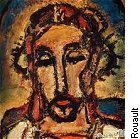
[ The following is related to the month of Elul and the theme of teshuvah (repentance)... ]
08.30.18 (Elul 19, 5778) Concerning the theme of teshuvah, or "repentance," we read: "For this is what the high and lifted up One says, the One who abides forever, whose Name is Holy (קָדוֹשׁ): "I dwell in a high and holy place, but also with the broken and lowly of spirit, to revive the spirit of the lowly (i.e., ruach shefalim: רוּחַ שְׁפָלִים), and to revive the heart of the crushed" (i.e., lev nidka'im: לֵב נִדְכָּאִים) [Isa. 57:15]. Here we learn that God gives life (revives) to those who are "lowly in spirit" (שְׁפַל־רוּחַ), that is, to those who understand their own nothingness and complete dependence on God for life... Indeed, the "heart of the crushed" (לֵב נִדכֶּה) refers to being crushed "to the dust" -- the same word (dakka: דַּכָּא) is used to describe how Yeshua was "crushed for our iniquities" (see Isa. 53:10). William James called this deep work of the spiritual life "Zerrissenheit," a term that can be translated as "torn-to-pieces-hood," or a state of being utterly broken and in disarray... From the point of view of our dependence on God for salvation, "dakka" refers to humility and contrition we express in light of God's unmerited favor and love for our souls. We humbly identify with the death of Messiah offered on our behalf; we find healing and acceptance in the Presence of the One who was torn to pieces and made dust for our merit. Humility (עֲנָוָה) is essential to awareness of God in the truth. Shuvah Yisrael!
כִּי כה אָמַר רָם וְנִשָּׂא שׁכֵן עַד וְקָדוֹשׁ שְׁמוֹ
מָרוֹם וְקָדוֹשׁ אֶשְׁכּוֹן וְאֶת־דַּכָּא וּשְׁפַל־רוּחַ
לְהַחֲיוֹת רוּחַ שְׁפָלִים וּלְהַחֲיוֹת לֵב נִדְכָּאִים
ki · kho · a·mar · ram · ve·nis·sa · sho·khen · ad · ve·ka·dosh · she·mo,
ma·rom · ve·ka·dosh · esh·kon · ve·et · dak·ka · ush·fal · ru·ach
le·ha·cha·yot · ru·ach · she·fa·lim · u·le·ha·cha·lot · lev · nid·ka·im

"For this is what the high and lifted up One says, the One who abides forever,
whose Name is Holy: "I dwell in a high and holy place, but also with the broken
and lowly of spirit, to revive the spirit of the lowly and to revive the heart of the crushed."
(Isa. 57:15)

Download Study Card
Note: Thank you all so much for remembering this ministry in your prayers, for without your help I just couldn't do this work. May the LORD our God's blessing be upon you...
Shabbat Kumi Ori - קוּמִי אוֹרִי
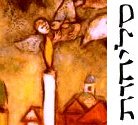
[ The following entry concerns this week's Torah reading, parashat Ki Tavo... ]
08.30.18 (Elul 19, 5778) The haftarah for parashat Ki Tavo (i.e., Isa. 60:1-22) is the sixth of the seven readings from the prophets that are consecutively read before Rosh Hashanah. These "haftarot of comfort" foretell of the restoration of the Jewish people and of the coming of the Messianic Era. In this week's reading, the haftarah portion describes the long-awaited future salvation of the nation of Israel. The LORD promises to shine His glorious light upon the Jewish people and to reveal His glory, despite the hour of darkness and tribulation that comes upon the earth:
"Arise and shine (קוּמִי אוֹרִי) for your light has come, and the glory of the LORD (כְּבוֹד יהוה) has risen upon you. For behold, darkness shall cover the earth, and thick darkness the peoples; but the LORD will shine upon you (וְעָלַיִךְ יִזְרַח יהוה), and his glory will be seen upon you (וּכְבוֹדוֹ עָלַיִךְ יֵרָאֶה). And nations shall come to your light, and kings to the brightness of your rising. Lift up your eyes all around, and see; they all gather together, they come to you; your sons shall come from afar, and your daughters shall be carried on the hip" (Isa. 60:1-4).
Sometime during the "plague of darkness" that represents the time of the Great Tribulation (i.e., the Day of the LORD and the judgment of the world, or Yom Adonai), Israel will finally turn to the LORD and receive Yeshua as their long-lost Messiah (Zech. 12:10). The veil will finally be taken away, and all Israel will be saved. The Light of Salvation (Yeshua) will be revealed and the glory of the LORD (כְּבוֹד יהוה) will radiantly shine (זָרָח) upon the Jewish people. The land of Israel will be like Goshen during the times of the plagues of Egypt as the world powers are all judged and destroyed. Then the survivors of the nations will understand that the LORD is indeed with Israel and will turn to Him in surrender as well. "And the glory of the LORD shall be revealed, and all flesh shall see it together, for the mouth of the LORD has spoken" (Isa. 40:5). Yeshua will return to Zion to establish the Kingdom of God upon the earth (Zech. 2:10-13).
קוּמִי אוֹרִי כִּי בָא אוֹרֵךְ
וּכְבוֹד יְהוָה עָלַיִךְ זָרָח
ku·mi o·ri ki va or·rekh
ukh·vod Adonai a·la·yikh za·rach

"Arise, shine, for your light has come,
and the glory of the LORD has risen upon you."
(Isa. 60:1)

Hebrew Study Card
Teshuvah and the Ark...
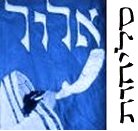
08.30.18 (Elul 19, 5778) The Ark of the Covenant (אֲרוֹן־הַקּדֶשׁ) was the innermost place of the Mishkan (or Tabernacle), a "three-in-one" box that contained God's Holy Word. As such, the ark served as a symbol of kisei ha-kavod (כִּסֵּא הַכָּבוֹד), the Throne of Glory. It stood entirely apart as the only furnishing placed in the Holy of Holies (קדֶשׁ הַקֳּדָשִׁים). Upon the cover of the Ark (i.e., the kapporet) were fashioned two cherubim (i.e., angel-like figures) that faced one another (Exod. 25:17-18). According to the Talmud (Succah 5b), each cherub had the face of a child - one boy and one girl - and their wings spread heavenward as their eyes gazed upon the cover (Exod. 25:20). This was the sacred place where the blood of atonement was sprinkled on Yom Kippur, the Day of Atonement. God's voice would be heard only in the midst of innocence, humility, purity, and hope...
The thought of two innocent children's faces peering before the Throne of God gives fresh meaning to the statement that unless you "turn and become like children, you will never enter the kingdom of heaven" (Matt. 18:1-3). The most important things of life are only known through love, and so-called knowledge apart from love is actually nothing (1 Cor. 13:2). Knowledge "puffs up" (φυσιόω), that is, it swells and feeds the ego and its posture before others, whereas love "builds up" (οἰκοδομέω), that is, it is other-focused and seeks to create a sense of habitation and a place of safety. "If anyone imagines that he knows something, he does not yet know as he ought to know; but if anyone loves God, he is known by Him" (1 Cor. 8:2-3). May God help us shine his love as His dear children...
Love is the reason we turn to God; it is the basis for teshuvah: "We love Him because He first loved us." We answer God's love by turning to Him.... that is the very first step. We must first receive hope into our hearts and that starts us on our way...
Kuma Na - Please arise!
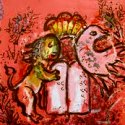
[ The Leil Selichot service is traditionally offered a week or so before Rosh Hashanah.... ]
08.29.18 (Elul 18, 5778) It was an old custom that on the Saturday night before Rosh Hashanah, just a few minutes before midnight, for the town shamash to go through the neighborhood, rapping three times on each door shouting, Kuma na! - "Please arise to serve the Creator!" And everyone would quickly assemble for selichot (i.e., penitential) prayers. The appeal to the revelation of the Name YHVH (יהוה) and the 13 attributes of God's mercy is the central theme of the midnight prayer service...
Contrary to what you might expect, the recitation of the traditional selichot (i.e., the 'A' to 'Z' confession of sins) is recited with joy, based on a passage from our Torah portion this week (i.e., Ki Tavo) which says that we are punished "because we did not serve God with rejoicing and a full heart" (Deut. 28:47). The essence of joy is a sense of well-being and gratitude that comes from trusting in God's love. This is implied in the bikkurim (firstfruits) ceremony that begins the portion. We are commanded to take our "first fruits," go to the Temple, and express our thanks: ve'samachta bekhol ha-tov asher natan lekha (וְשָׂמַחְתָּ בְכָל־הַטּוֹב אֲשֶׁר נָתַן־לְךָ) - "you will celebrate for all the good God has given you" (Deut. 26:11).Ultimately we find lasting joy when we trust that we are truly loved, forgiven, and accepted -- despite the long litany of our sins... Therefore we find consolation and joy in the salvation given in Yeshua our LORD, who gave up His life so that we could be accepted by God.
"A person reposes in the forgiveness of sins when the thought of God no longer reminds him of the sin, but of the fact that it is forgiven, so that what is past is not a recollection of how much he offended, but of how much he has been forgiven.... Eternal justice can and will forget in only one way - through forgiveness in Christ - but then, of course, the believer must not forget and must steadfastly recollect that it is forgiven him." (Kierkegaard, Journals)
Evil and Ignorance...

08.29.18 (Elul 18, 5778) There is the great danger of squandering and dissipating our lives... Examine yourself; consider what really moves you. Be careful not to deceive yourself by "reasoning around the truth" (i.e., παρα + λογίζομαι), as James the Righteous puts it (James 1:22). Many people fool themselves by assuming they know or understand what is good, but they confine this ideal to a matter of opinion rather than experiencing it as a matter of the will (or they confuse their opinion of the ideal with what is real). Some of the ancient Greek philosophers assumed that moral evil was the result of ignorance, and that simply knowing the good would lead to doing the good. For example Socrates states in the Protagoras that no one knowingly does the wrong thing, and therefore all evil is the result of ignorance. He argues this way because he assumes that doing wrong harms the soul, and since no one willingly acts against his own interests, wrongdoing must be result of ignorance. This optimistic view implies that the answer to the problem of moral evil is "education," or leading people out of the dark cave of their lower nature to experience the light of reason. If we just really understood why doing this or that sinful thing hurts us, we would change our ways and repent, or so the theory goes... Alas, human experience proves that such "head knowledge" often does not change the way we choose, and we all know people who have habits they realize are harmful but continue to indulge in them anyway.
There may be some truth to the idea that evil is a matter of ignorance however, since ignoring what is good, being indifferent, apathetic, and cynical is a defect of character (ἀκρασία), and learning to be honest, upright, courageous, unselfish, and so on, requires personal struggle to make the "ought" of moral reality an expression of the "is" of inner life. What is often most shocking about moral evil is that it expresses apathy or indifference toward the objections of conscience. Moral evil is essentially heartless and devoid of empathy, a state of cold-heartedness and callousness for the feelings and dignity of others. According to the Jewish philosopher Hannah Arendt, the lack of moral thought and reflection creates what she called the "banality of evil," that is, the unthinking acceptance of evil so that it is no longer regarded as outrageous or strange. People deaden their conscience by refusing to honestly engage questions such as: "What is goodness?" "Is evil real?" "Do we have an obligation to observe moral truth?" "What is the good life?" "How should we live?" "Do our actions really matter?" "Will God judge my life?" and so on. On the other hand, our culture has been so shocked by the ongoing practice of lawlessness wickedness that people have lost their sense of shame. We are no longer shocked and outraged when we hear of the latest crimes or abuses of power in our postmodern world.... We must be careful, however, not to become evil by despising what is evil. For instance, we may feel so outraged and threatened by the evil actions of others that we deny their humanity, thereby becoming the very thing we hate.
The heart is deceitful above all things and desperately sick; who can understand it? (Jer. 17:9). "Oh there is nothing as deceitful and as cunning as a human heart, resourceful in seeking escapes and finding excuses; and there surely is nothing as difficult and as rare as genuine honesty before God." (Kierkegaard: Discourses). Therefore we pray: "Heal me, O LORD, and I shall be healed; save me, and I shall be saved.. Be not a terror to me; you are my refuge in the day of evil" (Jer. 17:14, 17).
The spiritual danger here is being "pulled apart" in opposite directions, dissipated the soul so that it will not be unified, focused and directed. Both loving and hating the good is a state of painful inner conflict, ambivalence, and self-contradiction. "Who can bring a clean thing out of an unclean? there is not one" (Job 14:4), yet this is our starting point: "I find it to be a law that when I want to do right, evil lies close at hand" (Rom. 7:21). We are often willing and unwilling, or neither willing nor unwilling, and this makes us inwardly divided, weak, fragmented, anxious, and "soulless." An honest faith that "wills one thing" binds the soul into a unity, or an authentic "self." As King David said, "One thing have I asked of the LORD, that will I seek after: that I may dwell in the house of the LORD all the days of my life, to gaze upon the beauty of the LORD and to inquire in his temple" (Psalm 27:4).
The Scriptures warn that a "double-minded person is unstable in all his ways" (James 1:8). The word translated "double-minded" is dipsuchos (δίψυχος), which literally means having "two souls." A double-minded man is full of inner conflict and indecision; he's like the proverbial "divided house" that cannot stand. The way to be healed of a divided heart is to earnestly make a decision: "Draw near to God, and he will draw near to you" (James 4:8). There are no conditions given here -- other than your raw need to connect with God for help. "Purify your hearts, you double-minded ones" (δίψυχοι, lit. "two-souled ones"); make up your mind and be unified within your heart: "How long will you go limping between two different opinions?" (1 Kings 18:21). You are invited to come; God has made the way; your place at the table has been set and prepared. "Let us draw near with a sincere heart in full assurance of faith (ἐν πληροφορίᾳ πίστεως), with our hearts sprinkled clean from an evil conscience and our bodies washed with pure water. Let us hold fast the confession of our hope without wavering, for he who promised is faithful" (Heb. 10-22-23).
דִּרְשׁוּ יְהוָה בְּהִמָּצְאו
קְרָאֻהוּ בִּהְיוֹתוֹ קָרוֹב
dir·shu · Adonai · be·hi·matz·o
ke·ra·u·hu · bi·yo·to · ka·rov

"Seek the LORD while he may be found;
call upon him while he is near."
(Isa. 55:6)

Hebrew Study Card
God responds to those who sincerely cry out to him (Psalm 145:18). He is "near to the brokenhearted and saves the crushed in spirit" (Psalm 34:18). Indeed, salvation is as close as your own mouth and heart (Rom. 10:8-13). But how many are the days of your life? How many opportunities for you to make up your mind? "How long will you go limping between two opinions?" Therefore choose this day whom you will serve. Make the first step; open your heart, and the LORD will then help you make the wholehearted decision to "seek the LORD while He may be found; call upon Him while He is near." Amen.
A Blessed Desperation...
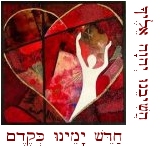
[ The following is related to the month of Elul and the theme of teshuvah (repentance)... ]
08.29.18 (Elul 18, 5778) "And he opened his mouth and taught them, saying... 'Blessed are those who hunger and thirst for righteousness, for they shall be filled'" (Matt. 5:6). Many people hunger for spiritual experiences, for material "blessings," or for signs of the miraculous, while others seek knowledge and wisdom, but it is the righteousness of God that alone truly satisfies the heart (Matt. 6:33). This righteousness is not achieved by means of performing religious rituals or by doing good deeds, but instead "comes to life" within the heart by trusting in Yeshua, the righteousness of God (צִדְקַת אֱלהִים). He is the vine and we are branches, and as we draw life from him, his life flows within us to bear deeds of righteousness to the praise and glory of God (John 15:1-5; 1 John 3:7). But note that while we can't attain righteousness by means of virtuous deeds, the cost for attaining such is confession of the truth of our condition: brokenness and mourning of heart (Matt. 5:3-4). Those who profoundly hunger for deliverance from their moral bankruptcy and grieving of heart will be satisfied, but only those who do so. God will indeed wipe away our tears, but the tears must be shed...
The Torah of Yeshua is heeded by the "impoverished of spirit" who know they must "find God or die." It is first a word spoken to the shattered of heart and crushed of spirit. Those who empty themselves before God will find their own desire fulfilled, for God will satisfy them with inner peace and joy. This is the righteousness of God that is known by yielding to His love secured in Messiah. The "fruit of the Spirit" is then expressed in the heart through acts of gratitude and mercy, that is, "faith working through love" (Gal. 5:6). Teshuvah is always a response to God's compassion, as it says, "we love him because he first loved us" (1 John 4:19). Paradoxically, we never find ultimate satisfaction in finite things, but only by seeking the Eternal One, and by means of seeking the infinite we find the delight to seek further still: "Come further up, come further in!" It is great blessedness to be desperate for God, to long for him more and more; to keep asking, seeking, knocking (Matt. 7:7). When we seek first the kingdom of God and his righteousness as our supreme need, God will satisfy us by drawing us into an ever-deepening desire for him.
כִּי־הִשְׂבִּיעַ נֶפֶשׁ שׁקֵקָה
וְנֶפֶשׁ רְעֵבָה מִלֵּא־טוֹב
ki · his·bi·a · ne·fesh · sho·kei·kah
ve·ne·fesh · re·e·vah · mil·lei · tov

"For he satisfies the thirsting soul,
and the hungry soul he fills with good things."
(Psalm 107:9)

The LORD alone can satisfy the eternal yearning of our spiritual nature. As Augustine said, "You have made us for yourself, O Lord, and our hearts are restless until they rest in you."
"Blessed are those who hunger and thirst for righteousness, for they shall be filled" (Matt. 5:6). This beatitude again follows logically from the previous ones; it is a statement to which all the others lead. It is the logical conclusion to which they come, and it is something for which we should all be profoundly thankful and grateful to God. I do not know of a better test that anyone can apply to himself or herself in this whole matter of the Christian profession than a verse like this. If this verse is to you one of the most blessed statements of the whole of Scripture, you can be quite certain you are a Christian. If it is not, then you had better examine the foundations again." - D. Martin Lloyd Jones: Studies in the Sermon on the Mount
This great blessedness is found only by those who seek God be'khol levavkha, with all their heart, as it is written: "Seek me and live" (Amos 5:4). But we must be vigilant, since a common tactic of the enemy of our souls is to induce us to forget our desperate need, seducing us to think we have already "arrived" or that we "know" all the answers. This is a grave danger. Those who regard themselves as rightly related to God are often deluded regarding their spiritual status (Luke 18:9-14; Rev. 3:15-20). The seeking heart is humble and knows that it has not yet attained to righteousness (Phil. 3:12-14).
Torah of Reproof (תּוֹרַת הַתּוֹכֵחָה)

[ The following entry concerns this week's Torah reading, parashat Ki Tavo... ]
08.28.18 (Elul 17, 5778) Our Torah portion this week includes Moses' seemingly endless description of terrible consequences that would befall the Jewish people if they disobeyed the terms of the Sinai covenant (Deut. 28:15-68). The "Torah of Reproof" (תּוֹרַת הַתּוֹכֵחָה) teaches us that we must turn to God every day; we must choose to set the LORD before us always (Psalm 16:8). This is implied by our Torah reading as well: After hearing each curse, the people were required to ratify the words by saying, 'Amen' (Deut. 27:15). We must say "amen" to both the blessing and to the curse, which means that we accept the infinite significance of our choices... For example, those who reject the first commandment, namely, to accept the LORD as their God, are subject to the spiritual implications, and yet to this we must also say "Amen" (Deut. 27:15). The great choice we face every day is whether or not we will surrender ourselves to the blessing of God... As Moses said, "I call heaven and earth to witness against you: today I set before you life and death, blessing and curse; therefore bacharta ba'chayim: choose life, that you and your offspring may live" (Deut. 30:19).
Note: For more on this very important topic, see "The Curses of the Law."
Our Duty to Joy...

08.28.18 (Elul 17, 5778) Our Torah reading for this week (parashat Ki Tavo) includes the second great "rebuke" (i.e., tochechah: תוֹכֵחָה) addressed to the community of Israel given in the Torah (the first was given earlier in parashat Bechukotai). In this sober and ominous section, the Lord promises the people great blessing if they would obey Him (Deut. 28:1-14), but forewarns that exile, persecution and other progressively worse punishments would befall them if they would break faith with Him (Deut. 28:15-68). The sages note that divine censure would come if the people "forgot their first love" for God and relaxed the observance of His laws due to indulgence: "Because you did not serve the Lord your God with joyfulness and gladness of heart, because of the abundance of all things, therefore [all these curses will come upon you]..." (Deut. 28:47-48). Gratitude is prerequisite for serving the LORD, and gladness of heart is found in the grace He supplies us to do His will. Indeed, the Greek word for "joy" used in the New Testament (χαρα) is related to the word for "grace" (χαρις), so there is a profound connection between apprehending grace and experiencing joy (Phil. 4:4). When we say, "Blessed are You, LORD our God," we affirm the blessedness and joy that is part of God's essence and heart.
Sometimes, of course, it is difficult to express joy, especially when we feel oppressed, saddened, or wounded. The Scriptures never disavow our emotional states (read Psalm 13 or Psalm 88, for example), but an underlying note of grace is always sounded, even in painful moments and times. This is our consolation in suffering.... "sorrowful yet ever rejoicing" (2 Cor. 6:10). And this works the other way, too. Even in our most joyous occasions, such as the great simcha (happiness) of a wedding, the "glass is shattered" to remind ourselves that our eternal joy is not yet fulfilled... We live in an "already-not-yet" state of existence. Our best moments are beset with shadows; our darkest are limned with hope of the new eternal day to come. As Paul said, "I consider that the sufferings of this present time are not worth comparing with the glory that is to be revealed to us" (Rom. 8:18). Nevertheless we are instructed to "serve the LORD with gladness" (Psalm 100:2), which moved the sages to say, "It is a great mitzvah to be happy always." We can experience joy even in the midst of our struggles because the love of God overcomes the darkness within us....
Regarding the tochachah given earlier in the Book of Leviticus (i.e., Lev. 26:14-46), the sages point out that the phrase "if you walk contrary to me" (וַהֲלַכְתֶּם עִמִּי בְּקֶרִי) - which occurs several times during the great rebuke - really means "if you walk carelessly (i.e., keri: קְרִי) with me." Rashi notes that the verb karah (קָרָה) means "to befall" or "to happen" and therefore suggests a sense of randomness (the related word mikreh [מִקְרֶה] means "coincidence"). Once the people would begin to regard the events of life as "random," then God would reciprocate by bringing senseless trouble into their lives... For this reason an indifferent or careless attitude about God's will is often the very first step to eventual apostasy. In other words, regarding whatever happens in life as mere "coincidence" effectively denies God's Presence, and this attitude will eventually call for God's corrective intervention. People can be "hot or cold" regarding their relationship with Him, but God will never give the option of affecting indifference toward Him... Indeed, God often brings hardship into our lives to regain our attention and cause us to return to Him. As C.S. Lewis once said, "God whispers to us in our pleasures, speaks to us in our conscience, but shouts in our pains: It is His megaphone to rouse a deaf world."
Blaise Pascal once wrote: "I can feel nothing but compassion for those who sincerely lament their doubt, who regard it as the ultimate misfortune, and who, sparing no effort to escape from it, make their search their principal and most serious business. But as for those who spend their lives without a thought for this final end, I view differently. This negligence in the matter where they themselves, their eternity, their all are at stake, fills me more with irritation than pity: yea, it astounds and appalls me..." (Pensees, 427).
For more on this topic see the article, "Curses of the Law: Further thoughts on Ki Tavo."
The High Cost for Apathy...

[ The following entry concerns this week's Torah reading, parashat Ki Tavo.... ]
08.28.18 (Elul 17, 5778) "Cursed is anyone who does not uphold the words of this Torah to do them" (Deut. 27:26). This is because God is God, ultimate reality is non-negotiable, and we are entirely and eternally accountable for all that we do (Matt. 12:36; Heb. 4:13). "Each person's deeds will become manifest, for the Day will disclose it, because it will be revealed by fire, and the fire will test what sort of deeds each one has done" (1 Cor. 3:13). There is a Scroll that attests the reality of all truth, and the life of every soul created by God is recorded therein (Rev. 20:12). We are forbidden to add or subtract from Torah, since that is to refashion God's message into one of our own understanding. Reading the tochachah (i.e., rebuke) in our Torah portion is difficult and painful, though it serves as a bitter medicine to wake us up from our lethal coma. In that sense the tochechah is a great blessing, since it shocks us into experiencing the "gravity of God's grace." This is why Yeshua proclaimed grave warnings about the dangers of forfeiting life and thereby "receiving" hell... Sin is a lethal problem, and we must turn to God for healing or we will die. The Lord does not allow us to trifle with the truth, neither will he offer us a good that excludes Divine Reality since there simply is no such thing. God does not give us the option of affecting existential indifference toward Him, since apathy is as much a spiritual decision as is outright rebellion and apostasy. "If anyone thinks he has faith yet is indifferent toward this possession, is neither hot nor cold, he can be certain that he does not have faith. If anyone thinks he is a Christian and yet is indifferent toward being that, then he is not really one at all. Indeed what would we think of a person who gave assurances that he was in love and also that it was a matter of indifference to him?" (Kierkegaard: Works of Love). "Guard me, O God, for in you I take refuge. I say to the Lord, "You are my Lord; I have no good apart from you" (Psalm 16:1-2).
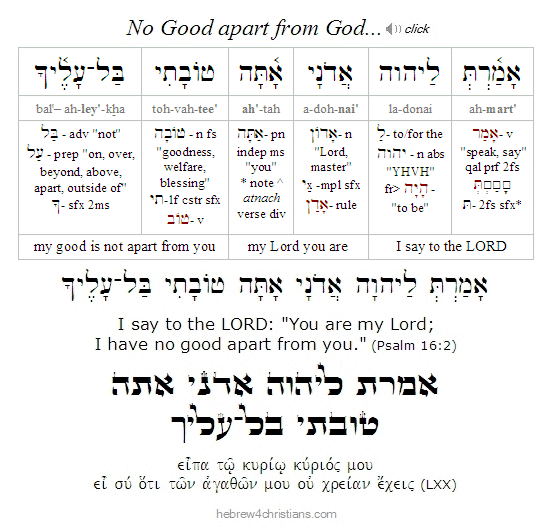 |
Sorrowful Grace...
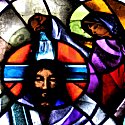
[ The following is related to the month of Elul and the theme of teshuvah (repentance)... ]
08.27.18 (Elul 16, 5778) While it's true that we express sorrow and regret for our sins - we mourn over our lives - this is part of the healing process, with the end result of obtaining comfort from God (Matt. 5:4). Mere regret over sin is not enough, however, since the motive may be from shame (pride) or disappointment over some selfish loss. Esau repented with tears, but his wasn't true repentance since he didn't lament the loss of his heart to God's love... True repentance leads to healing and life. When the woman from Magdala wept and washed Jesus' feet with her tears, he said, "I tell you, her sins, which are many, are forgiven -- for she loved much" (Luke 7:44-48). In other words, she was lavish in her love because she deeply regretted that she had missed what was most important, what she desperately needed all along... She saw her sin as blindness to God's love... After all, why would she weep over her sins unless she loved him? And how could she love him unless he first revealed his love to her? (1 John 4:19)
"For grief (λύπη) as intended by God produces a repentance (תְּשׁוּעָה) that leads to salvation, leaving no regret, but worldly grief produces death" (2 Cor. 7:10).
Repentance and Faith...

08.27.18 (Elul 16, 5778) Some people are scandalized by what they call "easy believism," or the idea that we only need to believe in Yeshua to be saved. Sometimes they call this teaching "cheap grace" or "sloppy agape," though in fairness it must be stressed that there is nothing easy about truly believing. What is easy, however, is professing that you believe without undergoing a miraculous heart transformation. Anyone can say, "I believe in Yeshua," but the test is whether he lives within you. Is he the source of your life? Do you draw life from Him? Anyone can claim they are saved, but it is a miracle greater than splitting the sea to undergo divine metamorphosis, to be given a heart that loves unconditionally, that dies to pride, and that lives as the servant of all. Yeshua asks, "Do you really believe? Many will say to me in that day, 'Lord, Lord...' but I will say to them, 'I never knew you...' (Matt. 7:22-23). It's not just hard to believe (obey), it's impossible apart from God's radical intervention. It is the Spirit that gives life; the flesh is no help at all (John 6:33).
Living by faith does not mean we profess Christianity or "talk theology" like some college professor. It's one thing to believe that, and another to believe in... Human reason can rightly infer that a morally good, all-powerful Creator exists, for example (Rom. 1:20), but it is unable to know God's love that way... Love requires trust, "taking to the heart." We are to "know this day and turn to your heart (והֲשֵׁבתָ אֶל־לְבָבֶךָ) that the LORD is God in heaven above and on the earth beneath; there is no other" (Deut. 4:39). We need to know truth (cognitive) and to be moved by the heart (emotional); we need both Spirit and Truth (John 4:24). "For all things come from You (כִּי־מִמְּךָ הַכּל), and from your hand we give to you" (1 Chron. 29:14). Teshuvah centers on Yeshua our Savior: turn to believe in Him!
New Audio on Ki Tavo...

08.27.18 (Elul 16, 5778) I was able to complete a new "Shavuah Tov" audio broadcast for parashat Ki Tavo late last night which is now ready for online listening or download (see the links below). In this audio I review both the 40 day "Season of Teshuvah" leading up to the Jewish High Holidays as well as our weekly Torah portion (i.e., parashat Ki Tavo) which includes discussion about offering of firstfruits (bikkurim), the duty to offer tithes (ma'aser), the "blessings and curses" covenant ratification ceremony to be held at Mount Ebal, and the prophetic rebuke Moses foretold over Israel (i.e. the tochechah). Throughout this broadcast I hope to encourage you to turn your heart to God while there still is time.
Leil Selichot Service...
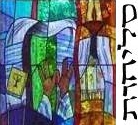
[ Since this coming Shabbat is the one of the last of the year, many congregations will hold a late-night service to offer prayers for forgiveness (selichot) in anticipation of the High Holidays. ]
08.27.18 (Elul 16, 5778) The Hebrew word selichah (סְלִיחָה) means "excuse me!" in modern Hebrew, but in the Scriptures it refers exclusively to God's offer of pardon and forgiveness of the repentant sinner. Therefore we read in the Scriptures, "But with you there is forgiveness (selichah), that you may be feared" (Psalm 130:4):
כִּי־עִמְּךָ הַסְּלִיחָה לְמַעַן תִּוָּרֵא
ki im·me·kha ha-se·li·chah le·ma'an tiv·va·rei

"But with you there is the forgiveness,
that you may be held in awe."
(Psalm 130:4)

The plural form of the word selichah is selichot (סְלִיחוֹת), a term used in Jewish tradition to refer to additional penitential poems (פּיּוּטִים) and prayers recited throughout the "Forty Days Teshuvah" (many of these prayers may be found in a High Holiday Machzor or prayerbook). On the Saturday night before Rosh Hashanah, many congregations hold a late-night "Selichot Service" (called leil selichot, literally, "night of penitential prayers") to offer prayers for forgiveness in anticipation of the High Holidays. During this service, the chazzan (cantor) often dresses in a kittel (white burial shroud) and chants in a style similar to the liturgy for Rosh Hashanah and Yom Kippur.
The End of Brokenness...

[ The following is related to the month of Elul and the "Season of Repentance"... ]
08.26.18 (Elul 15, 5778) Spirituality is lived now, in this world... "I do not ask that you take them out of the world, but that you keep them from the evil one" (John 17:15). We are "in but not of" the world; we are part yet also not part of it... This is the tension of living in the realm of the "already-not-yet." We are haunted by a sense of incompletion - a yearning for the fulfillment of our salvation, an inner ache that helps focus the heart's affections...
A paradox of the spiritual life is that we must descend to ascend... We all sin; we all fall short. First we must accept our own "dark side" -- our own sinful nature -- before we can ever come to know the light... This is the path of confession - acknowledging the truth about who we really are, which is the only way we can learn to "endure ourselves" and eventually let go of our shame. We find ourselves when we give up our defenses and take hold of God's compassion. We all have our sins; now we must find our courage in God's love.
כִּי־פְשָׁעַי אֲנִי אֵדָע
וְחַטָּאתִי נֶגְדִּי תָמִיד
kee-fe·shah·ai · a·nee · ei·dah
ve·chat·tah'·tee · neg·dee · tah·meed

"For I know my transgressions,
and my sin is ever before me"
(Psalm 51:3)

We must learn to "endure ourselves..." We can't deny who we are; we can't pretend to be what we are not. The root of shame is self-rejection. This is the hidden anguish of heart that leads many of us astray. As Henri Nouwen said, "There are two extremes to avoid: 1) being completely absorbed in your pain and 2) being distracted by so many things that you stay far away from the wound you want to heal." We don't come to the cross to destroy ourselves but to find deliverance and life: our brokenness is a means to this greater end. We "take up the cross daily," which means learning to forgive and endure ourselves... As theologian Paul Tillich once insightfully said: "The courage to be is the courage to accept oneself as accepted in spite of being unacceptable..." (Tillich).
In this age, we are part of a seemingly endless journey of falling down and getting back up once again. It is this struggle, this "good fight of faith," that eventually ennobles the heart and establishes character... In light of this, we must refuse to lose heart when things appear to be going badly, and likewise we must remain vigilant when things seems to be going well. The goal of the process is always to be in heartfelt, genuine, and earnest relationship with the LORD. As Madame Guyon once wrote, "You are born into the world like an illegitimate child who has no idea who his father is. But God comes and draws you out of your old life. He cleanses you and gives you back your innocence."
Yearning for Heaven...

08.26.18 (Elul 15, 5778) It is an ongoing struggle to live in this world without being devoured by its fear, insanity, and violence. Yeshua prayed for his followers saying, "I am not asking you to take them from the world but to keep them from the evil one. They do not belong to the world any more than I belong to this world" (John 17:15-16). To live in the world without belonging to the world marks the life of the tzaddikim (righteous ones) who are seeking the house of love, the place where God abides. Even though we are given "traveling mercies" for our journey in this world, we must lift our heart toward heaven, scorning the world and its vanities, and regarding the place of God's heart to be our true home. Abraham closed his eyes to this world and was given the inner light of truth that would reveal his way to God. "By faith Abraham obeyed when he was called to go out to a place that he was to receive as an inheritance. And he went out, not knowing where he was going (μὴ ἐπιστάμενος ποῦ ἔρχεται). By faith he sojourned in the land of promise as in a strange land, living in tents with Isaac and Jacob, heirs with him of the same promise. For he was looking forward to the city that has foundations, whose designer and builder is God" (Heb. 11:8-10). For here we have no lasting city, but we seek the city that is to come (Heb. 13:14). So lift up your soul unto the LORD and refuse to live in fear. Stand strong in faith, trusting God's promise even if you are in darkness. "Blessed is the one who makes the LORD his trust" (Psalm 40:4).
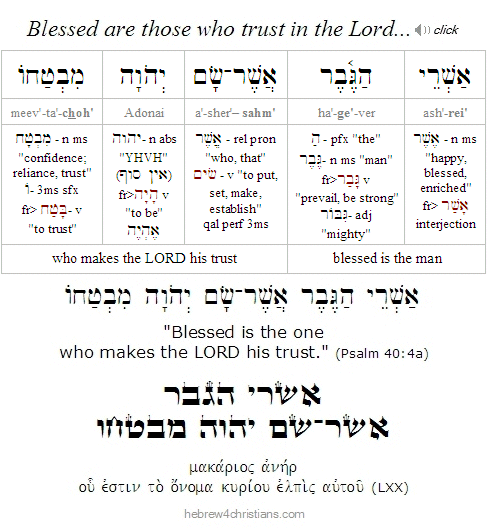 |
Parashat Ki Tavo - כי־תבוא

08.26.18 (Elul 15, 5778) Shalom dear friends in the Messiah (שלום חברים יקרים במשיח). Our Torah portion this week (parashat Ki Tavo) includes instructions for the people to ratify the Sinai covenant in the promised land by means of a special ceremony performed in the valley between Mount Ebal and Mount Gerazim (later fulfilled by Israel, see Josh. 8:30-35). During this ceremony the blessings for obedience and the curses for disobedience would be declared, and Moses warned the people by providing a seemingly endless description of terrible consequences that would befall the Jewish people if they disobeyed the terms of the Sinai covenant (Deut. 28:15-68). In Jewish tradition this litany of woe is called the "tochachah" (תּוֹכָחָה), a word that means "rebuke" or "reprimand." Reading the tochachah is difficult and painful, though it serves as a bitter medicine to wake us up and prevent us from falling into a lethal coma. In that sense the tochechah may be regarded as a great blessing, since it shocks us into experiencing the gravity of God's grace. This is similar to Yeshua's grave warnings about the dangers of hell. If we refuse to listen or rush past his words, we are missing the substance of God's lament given through the Hebrew prophets. Sin is a lethal problem, and we must turn to God for healing or we will die. As Blaise Pascal once wrote, "Between heaven and hell is only this life, which is the most fragile thing in the world." Therefore shuvah! -- turn to God and receive the blessing of life!
Lord, Heal my Life...

08.24.18 (Elul 13, 5778) "Be merciful to me, O Lord, a sinner..." (Luke 18:13). Here there is no litany of sins recited; no lengthy confession, no inventory of misdeeds enumerated, but rather a wholesale confrontation with the reality of the heart's sin-sick condition. It's not this or that sin that sends us into exile but a heart unwilling to confront God's mercy. We aren't sinners because we sin; we sin because we are sinners, and therefore the issue of God's mercy is total and severe. Our essential problem is spiritual death, being "stillborn in the natural," and therefore we need the miracle of a new life. Focusing on our sinful deeds misses the point of our heart's need for radical mercy, and as long as we are missing that we are running away from the truth of our underlying sin, which is the denial of our lost condition and our need for love. We must begin there, with the confession of our inner poverty, to find healing and grace to seriously attend to matters of our misdeeds and sins before heaven.
אֲנִי־אָמַרְתִּי יְהוָה חָנֵּנִי
רְפָאָה נַפְשִׁי כִּי־חָטָאתִי לָךְ
a-nee · a-MAR-tee · Adonai · cho-NAY-nee
re-fah'ah · naf-shee · kee · cha-TAH-tee lakh

"I said, 'O LORD, be gracious to me;
Heal my soul, for I have sinned against Thee.'"
(Psalm 41:4)

Witness of the Spirit...

08.24.18 (Elul 13, 5778) "The Spirit shall testify of me" (John 15:26). But what is the testimony of the Spirit but the truth of the unconditional love of God given in Yeshua? The inner witness from heaven gives light to our darkness and overcomes all our fears. A great challenge, however, is to personally receive the blessing of God's acceptance because we demand to define the conditions in our own terms (that is, we refuse to believe). So do you really want to be made new? Are you ready to turn away from your deep-rooted and habitual distance from God by surrendering to his love for you? Salvation is about being healed from your self-imposed exile to experience God's compassion for your life. The Holy Spirit moves you beyond the rules of "religion" and the "hired servant" mentality to that of a beloved and celebrated child (Luke 15:18-24). The hired servant does not live in the house forever, but a child of the Father does: "If the Son therefore shall make you free, you shall be free in reality" (John 8:36). If you ever find yourself seeking God's love by appealing to anything other than God's own heart, for instance, through your religion, your good deeds, and so on, or if you withhold your inner pain, seeking to escape your sinfulness, then you are still in fear, which is a state of unbelief. Prayer means surrendering your fears, abandoning yourself to God's heart, and letting go until you are finally able to receive the blessing...
"For all who are led by the Spirit of God are children of God. For you did not receive the spirit of slavery to fall back into fear, but you have received the Spirit of adoption (πνεῦμα υἱοθεσίας) as children, by which we cry, "Abba! Father!" The Spirit confirms within our spirit (συμμαρτυρεῖ τῷ πνεύματι ἡμῶν) that we are children of God (Rom. 8:14-16).
The Fruit of our Words...

08.24.18 (Elul 13, 5778) From our Torah portion this week (Ki Teitzei) we read: "You shall guard yourself against every evil thing" (Deut. 23:10). The sages remark that a person is called "wicked" when the lower nature within him prevails, but since wickedness begins with evil thought, it is crucial to keep our thinking clear and pure. If you find yourself scoffing or using your words to express negativity (even in your prayers), then turn to God who knows all things and ask for help and forgiveness. "Let the words of my mouth and the meditation of my heart be pleasing in your sight, O LORD, my Rock and my Redeemer" (Psalm 19:14).
Recall that Yeshua taught us that as a tree is to its fruit, so is a person's heart is to his speech. Our words arise from an underlying source and root: "I tell you, on the Day of Judgment people will give account for every careless word (πᾶν ῥῆμα ἀργὸν) they speak, for by your words you will be justified, and by your words you will be condemned" (Matt. 12:36-37). First note that the phrase translated "every careless word" can be understood as "every 'workless' word," that is, every vain or empty word spoken, every broken promise, every insincere utterance, and so on. Second, note that there is a relationship between naming and being in Hebrew thought, and indeed the Hebrew word davar (דּבר), usually translated as "word," can also mean "thing." This suggests that our words define reality - not in an absolute sense, of course - but in terms of our perspective and attitude, and for that we are held responsible before the LORD. Since our words express our thoughts, Yeshua wants us to make up our minds: "Either make the tree good and its fruit good, or make the tree bad and its fruit bad, for the tree is known by its fruit" (Matt. 12:33).
In light of these things, listen to the words of your heart and understand that they are devarim, "things" that are defining the course of your life right now. Our thoughts and words "exhale" the breath of God that was given to each of us. In a very real sense they serve as "prayers" we are constantly offering.... And may it please our gracious and long-suffering LORD to answer the cry of our heart: "Let the words of my mouth and the meditation of my heart be pleasing in your sight, O LORD, my Rock and my Redeemer." Amen.
יִהְיוּ לְרָצוֹן אִמְרֵי־פִי
וְהֶגְיוֹן לִבִּי לְפָנֶיךָ יְהוָה צוּרִי וְגאֲלִי
yi·he·yu · le·ra·tzon · im·rei · fi
ve·heg·yon · lib·bi · le·fa·ne·kha · Adonai · tzu·ri · ve·go·a·li

Let the words of my mouth and the meditation of my heart
be pleasing to You, O LORD, my Rock and my Redeemer.
(Psalm 19:14)

Hebrew Study Card
Teshuvah and Truth...

[ The following is related to the month of Elul and the theme of teshuvah (repentance)... ]
08.23.18 (Elul 12, 5778) In the New Testament, the Greek word metanoia (and its related verb, metanao) is the most commonly used word to express the idea of "repentance." The compound word is formed from 'μετα' (after, with) and 'νοεω' (to think) and generally means "changing your mind" (in the noun form) or "thinking differently" (in the verb form). Since it can also represent an "afterthought" expressed emotionally as disappointment over a loss of some kind, metanoia is similar to the idea of nacham (נָחַם) in the Hebrew Scriptures, which literally means to "sigh" as a way of expressing regret or consolation. The Greek word strepho (στρέφω), like the Hebrew word shuv (שׁוּב), means to "return" to God in a practical sense, that is, by performing acts of contrition. In either case, however, a change of direction is implied, and that change ultimately begins with how we think and what we regard as truth. Repentance, then, involves a new vision, a new way of seeing reality...
Yeshua's earthly ministry began with the message, "The time has come and the kingdom of God draws near: repent (μετανοεῖτε) and believe (πιστεύετε) the good news" (Mark 1:15). These two verbs (repent, believe) are in the imperative mood. We are commanded to repent, to "change our thinking," and to turn away from hopelessness - and the sin that hopelessness begets - by accepting God's intervention and deliverance. But you cannot believe if you do not first turn, and therefore you must change your focus: clear away the world's distractions and ready your heart to hear the message. It is in the desert places that we "prepare the way of the Lord and make straight a highway for our God."
קוֹל קוֹרֵא בַּמִּדְבָּר פַּנּוּ דֶּרֶךְ יְהוָה
יַשְּׁרוּ בָּעֲרָבָה מְסִלָּה לֵאלהֵינוּ
kol · ko·rei · ba·mid·bar · pa·nu · de·rekh · Adonai
ya·she·ru · ba·a·ra·vah · me·sil·lah · le·lo·hei·nu

A voice cries out: 'In the desert prepare the way of the LORD;
make straight in the steppes a highway for our God.'
(Isa. 40:3)

Note that the word translated "prepare" in this verse (i.e., panu) comes from a root word (פָּנָה) that means to turn to face someone... The Hebrew word panim (פָּנִים), "face," comes from the same root, as does the word penimi (פְּנִימִי), "inner," and the word penimiyut (פְּנִימִיוּת), meaning "inwardness" or "immanency." This suggests that we must go within our own hearts, and there, in our "desert places," we will encounter the Presence of the LORD. It is in the solitude of the desert - away from the noise and distractions of this vain world, where we can focus our heart, confess our sin, and express our great need for God... Being honest with ourselves makes us yashar (יָשַׁר), and crooked ways are made straight for God to be received... The Hebrew word mesilah (מְסִלָּה) alludes to the ladder (i.e., sullam: סֻלָּם) that Jacob saw in the desert when he received the blessing of God (Gen. 28:12). Yeshua is the Bridge, or Ladder (הַסֻּלָּם), that unites and mediates heaven and earth (John 1:51).
Since God holds us responsible to repent and believe the truth of the gospel (Acts 17:30-31), He must have made it possible for us to do so ("ought" implies "can"). And indeed, God has created us in His image so that we are able to discern spiritual truth. He created us with a logical sense (rationality) as well as a moral sense (conscience) so that we can apprehend order and find meaning in the universe He created. All our knowledge presupposes this. Whenever we experience anything through our senses, for example, we use logic to categorize and generalize from the particular to the general, and whenever we make deductions in our thinking (comparing terms, making inferences, and so on), we rely on logic. We have an innate intellectual and moral "compass" that points us to God.
Since we all necessarily must think in order to live, we should value clear thinking. This should be obvious enough, though people often make various errors and misjudgments because they devalue the effort required to carefully think through a question. As William James once said, "A great many people think they are thinking when they are merely rearranging their prejudices." When it comes to questions about the gospel, however, God regards such carelessness to be blameworthy. Again, the LORD holds us accountable for what we think and believe, especially when it comes to the reality and mission of His Son.
The truth about God is always available to human beings, if they are willing to look for it. The Divine Light that was created before the sun and the stars represents God's immanent presence that "lights up" all of creation - including our minds (Gen. 1:3). As Paul stated, "the invisible things of Him from the creation of the world are clearly seen so that people are without excuse" (Rom. 1:19-20). The heavens are constantly attesting to the reality of God's handiwork (Psalm 19:1). All of creation "shouts out" that there is a God. Even small children understand this.
Note: People perish because "they refuse to love the truth and so be saved" (2 Thess. 2:10-12). Therefore the issue of truth - physical, moral, aesthetic, spiritual, etc. - is central to salvation itself. For more on this subject, see "Teshuvah of the Mind."
Restoring what is Lost...

[ The following entry concerns this week's Torah reading, parashat Ki Teitzei. Please read the Torah portion to "find your place" here. ]
08.23.18 (Elul 12, 5778) "Do not ignore the loss of your brother... you shall restore it to him" (Deut. 22:1-3). The Torah states that it is a moral duty to return lost items to others, and on a spiritual level that includes restoring honor and dignity to those who have lost sight of their value in the eyes of God... For even greater reason we must make restitution to those whom we have harmed. Making amends is part of the teshuvah process. We hurt ourselves when we hurt others, and we hurt others when we hurt ourselves. The way out of that circle is through making amends. As Yeshua taught: "If you are offering your gift at the altar and there remember that your brother has something against you, leave your gift there before the altar and go. First be reconciled to your brother, and then come and offer your gift" (Matt. 5:22-23). "Therefore, confess your sins to one another and pray for one another, that you may be healed. The prayer of a righteous person has great power as it is working" (James 5:16). Ultimately, confession of the truth is not optional for anyone.
Indeed, regarding the duty to restore what is lost to our brother mentioned above, the Torah adds, "and you are not to ignore it," which literally reads, "you are unable to hide it" (לא תוּכַל לְהִתְעַלֵּם). Rabbi Abraham Twerski notes that the Torah is not giving us a command as much as stating a fact: You are unable to hide from a wrongful act. In other words, the problem with "getting away with it" is that you get away with it, that is, you take it with you. Such self-deception sears your conscience, makes you numb inside, and deadens the heart. Making amends to others is life-giving, helping you let go of what you've done wrong to restore inner peace. We must be vigilant not to let our hearts die because of either shame or rationalization. May the LORD help us walk in the Spirit of Truth.
Fighting Spiritual Blindness...

[ The following entry concerns this week's Torah reading, parashat Ki Teitzei.... ]
08.22.18 (Elul 11, 5778) Our Torah portion this week (Ki Teitzei) commands us to remember what the Amalekites did to the Jewish people just after they left Egypt during the time of the Exodus (Exod. 17:8-16; Deut. 25:17-19). Paradoxically God commanded the Israelites to "blot out the remembrance" of Amalek while swearing to fight Amalek "from generation to generation" (Deut. 17:16). In this connection note that the name "Amalek" (עֲמָלֵק) begins with the letter Ayin (symbolizing the eye) and equals 240 in gematria -- the same value for safek (סָפֵק), the Hebrew word for doubt. Amalek therefore symbolizes "the eye of doubt," or even "the severed eye" (the Hebrew verb מָלָק means "to chop" or "sever" in reference to the "eye" of Ayin). The power of Amalek therefore represents spiritual blindness as it acts in the world. We are never to forget that the light of God overcomes the darkness of this world, and that light is found in Yeshua our LORD....
Note: For more on this important topic, see "Warfare with Amalek."
The Sacrifice of Isaac (not Ishmael)....

08.22.18 (Elul 11, 5778) The Hebrew verb for "love" (i.e., ahav: אָהַב) first appears in the Scriptures regarding Abraham's passion for his son: "Please take your son (קַח־נָא אֶת־בִּנְךָ), your only son (אֶת־יְחִידְךָ), the one whom you love (אֲשֶׁר־אָהַבְתָּ) and go to the land of Moriah, and offer him there as a burnt offering on one of the mountains of which I shall tell you" (Gen. 22:2). After journeying to the place, Abraham bound Isaac, laid him upon an altar, and raised his knife to slay him. At the very last moment, the Angel of the LORD (מַלְאַךְ יְהוָה) called out: "Abraham! Abraham! Do not lay your hand on the lad or do anything to him, for now I know that you fear God, seeing you have not withheld your son, your only son, from me" (Gen. 22:11-12). Abraham then "lifted up his eyes" and saw a ram "caught in a thicket" which he offered instead of his son. Abraham named the altar Adonai-Yireh (יְהוָה יִרְאֶה) "the LORD who provides" (Gen. 22:14). The sacrifice of the lamb for Isaac portrayed the sacrifice of Yeshua, the great 'Lamb of God' (שׂה הָאֱלהִים) who would die in exchange for the trusting sinner (John 1:29). Indeed the story of how God provided the lamb - first at Eden, later at Moriah, then during the Passover in Egypt, and finally through the sacrifice of Yeshua - may be understood as the "Gospel according to Moses" (Luke 24:27; John 5:46).
Isaac, the child of God's promise, not only pictures the sinner who trusts in God's sacrificial substitute, but also the One who offered himself in obedience to his heavenly Father. The Promised Seed illustrates how Yeshua "humbled himself by becoming obedient to the point of death, even death on a cross" (Phil. 2:7), and in that sense he is a type of Messiah. For instance, both Isaac and Yeshua were born miraculously; both were called "only begotten sons"; both were to be sacrificed by their fathers at Moriah; both experienced a "passion"; both willingly took up the means of his own execution; both were to be resurrected on the third day (Gen. 22:5, Heb. 11:17-19); and both demonstrate that one life can be sacrificed for another – the ram for Isaac, and Yeshua for all of mankind...
The Hebrew is clear that Isaac is the true heir of Abraham, and assuredly not Ishmael, as the account of the story from the Torah of Moses attests: "And he said, "Please take your son, your only son, whom you love, even Isaac... "
וַיּאמֶר - And he (God) said:
קַח־נָא- please take
אֶת־בִּנְךָ - your son
אֶת־יְחִידְךָ - your unique son
אֲשֶׁר־אָהַבְתָּ - whom you love
אֶת־יִצְחָק - namely, Isaac
"and go to the land of Moriah, and offer him there as a burnt offering on one of the mountains of which I shall tell you" (Gen. 22:2).
But what about Islam's claim that Ishmael was the one sacrificed by Abraham and not Isaac? Well bear in mind that the Torah of Moses goes back nearly 3,500 years ago (about 3,000 years before the Quran was composed) the text of which has been well attested by the Dead Sea Scrolls and other extant manuscripts throughout the centuries over and over again. Clearly, then Ishmael is not the son mentioned here, as both the context clearly implies, and as is further explicitly stated in various Scriptures (e.g. Gen. 22:12; Gen. 22:16, Rom. 9:7, Heb. 11:18) that "in Isaac shall be Abraham's seed be called" (כִּי בְיִצְחָק יִקָּרֵא לְךָ זָרַע). Ishamel, though indeed a physical child of Abraham. is not regarded as the true heir of the family (he is neither the bechor nor ben yachid), for Isaac was prophetically and exclusively chosen by God to be a type of the Messiah, the father of the "children of promise." He stands, therefore, in the allegory (Gal. 4:27-28) in direct contrast with Ishmael who "was born after the flesh" (i.e. because Ishmael came through the carnal union of Abraham and Hagar and not as a result of the promise of God given to Abraham and Sarah).
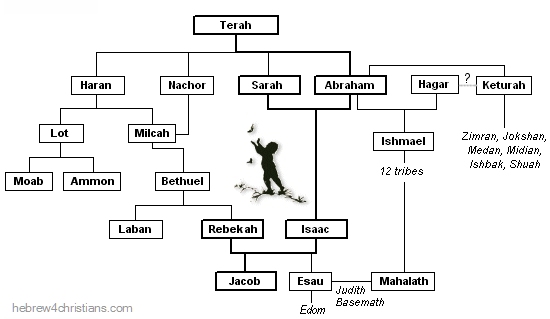 |
The ancient enmity between the sons of Abraham through Hagar (ie.., toldot Ishmael) and through Sarah (i.e., toldot Isaac) is the basis for the Arab-Israeli conflict to this very day... The Hajj, for example, is a pilgrimage based on the false claim that Abraham offered Ishmael, not Isaac, at the altar, though of course to reach this conclusion requires disregarding the plain sense of the Hebrew Scriptures and engaging dishonest ("revisionist") historical-grammatical exegesis. It is true that God blessed Ishmael, though that was a blessing not made according to the covenantal promise of the Messiah to come, but was rather a general blessing of hatzlacha. The true blessing of the Seed to Come is Messiah, a descendant of the Jewish people, a son of David and qualified King of Israel....
For more on this topic see: "The Sacrificed Seed: Further thoughts about the Akedah."
Truth Matters...
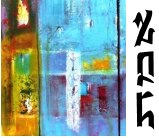
08.21.18 (Elul 10, 5778) Truth matters. I don't mean "opinion" here, but real, objective, hard-core truth. Truth reveals reality. Aristotle defined it this way: "To say of what is that it is not, or of what is not that it is, is false, while to say of what is that it is, and of what is not that it is not, is true" (Metaphysics). Genuine knowledge (γνῶσις), as opposed to illusion, depends on truth, since knowledge constitutes true belief, whereas illusion (and opinion) does not. The Greek word for truth is aletheia (ἀλήθεια, from α[not] + λήθω [to hide]) which implies being awakened to the revelation of being. The Hebrew word for truth is emet (אֱמֶת), which is related to the idea of fidelity or correspondence with reality (אָמַן). How you think about life has implications. You are responsible to think clearly. God's hidden attributes are clearly apprehended by the mind so that people who deny spiritual reality are without excuse (Rom. 1:19-20). If you think a map will faithfully guide you to the right place, you will use it; if you think it leads to an opposite end, you will not. Thinking one way leads you to success, whereas the other way leads to failure. The Scriptures state: yesh derekh yashar lifnei ish - "there is a way that seems right to a person," ve'acharitah darkhei mavet - "but its end is the way of death" (Prov. 14:12). Truth (אֱמֶת) apart from God who is Alef (א) leads to death (מֵת). Sincerity of conviction is no test of truth since you can be sincere and sincerely wrong. How many have perished in this world because they believed they were on the right course when in fact they were not? Yeshua made bold the claim that there was no way to know the heart of God apart from him... there is salvation is no other. Either he spoke the truth or he did not; either he can be trusted for the direction (תּוֹרָה) of your life or he cannot; either he expresses the Salvation of God or he does not. Choose this day whom you will serve...
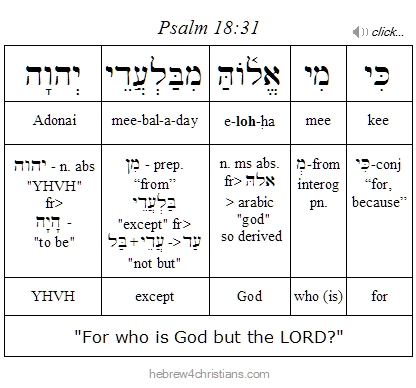 |
Note that the Arabic word "allah" was "borrowed" from the word Elah (אלהּ), a derivative of the Hebrew word Elohim (אֱלהִים), so this verse is stating that the LORD God of Israel (יהוה) is the LORD and Master over all worlds... greater than all other so-called gods.
Love's Greater Judgment...

08.21.18 (Elul 10, 5778) A sober admonition is given in our Scriptures regarding the great Day of Judgment (יוֹם הַדִּין) to come: "Not everyone who says to me, 'Lord, Lord,' will enter the kingdom of heaven, but the one who does the will of my Father who is in heaven" (Matt. 7:21). And yet what is the will of the Father but to trust in Messiah for life (John 6:40)? "What must we do, to be doing the works of God?" Yeshua answers: "This is the work of God, that you trust in the One whom he has sent" (John 6:28-29). The Torah of God centers on Messiah. On that day many will say to me, 'Lord, Lord, did we not ... do many mighty works in your name?' And then will I say to them, 'I never knew you; depart from me, you workers of lawlessness' (i.e., ἀνομία, from -α ('not') + νομος, 'torah') [Matt. 7:22-23]. From this statement we infer that ma'asim tovim (מַעֲשִׂים טוֹבִים), or "good works" -- even those done in the very Name of Messiah -- are insufficient for life, and that something more is therefore needed. Yeshua wasn't questioning their creed or theology, nor was he denying the deeds done in his name. What he was questioning was their heart, how they knew him, and whether they trusted in his love. "As long as Christ remains outside of us we are separated from him." Paradoxically, those who appealed to their good deeds were those who practiced "lawlessness," since they did not keep the law of faith (תורה של אמונה) in God's love...
"And this is one of the most crucial definitions ... that the opposite of sin is not virtue but faith." - Soren Kierkegaard (1813-1855)
The Curse of Sin and Death...

08.21.18 (Elul 10, 5778) We are told that we must "receive" the life of Yeshua into our hearts, and that is certainly true, but we must also receive his death as well... This is the meaning of "taking up your cross." It is the death of Yeshua in your place that releases you from the curse of the law (מִקִּלְלַת הַתּוֹרָה), that is, spiritual death, as it says, "the Messiah redeemed us from the curse of the law by becoming a curse for us, for it is written, "Cursed is everyone who is hanged on a tree" (Gal. 3:13). By faith we "lay hands" on him and "lean into" his death, confessing our guilt and sin and receiving his sacrifice as offered up for our sake. Our sins are "transferred" to his account, and his righteousness is transferred to ours. This is the idea of our "justification," -- "just-if-i'd" never sinned, and "just-if-i'd" always obeyed... As it is written, "God made the One who did not know sin to be sin for us, so that we would become the righteousness of God (δικαιοσύνη θεοῦ) in Him" (2 Cor. 5:21). It is the righteousness of God, not our own. We receive the "death benefits" of Yeshua, who has bequeathed to us the great inheritance of everlasting life and heaven itself... Our identification with His death makes us "free from the law," not in the sense that we are free to sin, but rather free to live in a different order of relating to God, a new and a better covenant, whereby we are given power over sin and death. "I have been crucified with the Messiah: It is no longer I who live, but Messiah who lives in me. And the life I now live in the flesh I live by faith in the Son of God, who loved me and gave himself for me. I do not nullify the grace of God, for if righteousness came through the terms of the law, then Messiah died for no purpose" (Gal. 2:20-21). Trusting in Yeshua gives us "access by faith into grace" so that we are fully and forever accepted in God's Presence...
Note, however, that we are delivered from the curse of the law (i.e., the verdict of the law), but not from the law itself, of course (Matt. 5:17-19). After all, the Torah, understood to refer to the will of the LORD our God, is written on our hearts by the power and agency of the Holy Spirit, the Spirit of Truth, in accordance with the promise of the New Covenant of God (Jer. 31:33). For more on this topic see the article, "Death with Messiah."
Come just as you are...

08.21.18 (Elul 10, 5778) Some people seem to think that we first must repent and then we will encounter the Lord, but it's actually the other way around: we first encounter our Redeemer and then we learn the true meaning of repentance. Thus Paul's eyes were opened after he was first blinded by the light (Acts 9:3-6). Likewise, it is only after we have experienced the Lord that we begin to understand our own blindness of heart, but as learn to see more clearly, we encounter more and more of his love (Rom. 5:20; James 4:6). As Yeshua said, "My yoke is pleasant (χρηστὸς) and my burden is light (Matt. 11:30). Teshuvah, then, is a progressive and ongoing process of awakening, as we learn to love God and to accept ourselves, despite our struggle with sin. As St. Anselm once prayed: "O Lord, grant us grace to desire thee with all our hearts, that so desiring, we may seek and find thee, and so finding thee, may love thee, and loving thee may hate those things from which you have redeemed us." Amen.
We encounter the Lord "just as we are," by means of his gracious intervention in our lives, and so we continue to live by faith in God's grace (indeed, what we call "sanctification" is often just "catching up" with the miracle of his revelation to us). And we always come to God "just as we are," since we are never more than what we are in the truth: "by the grace of God I am what I am," as Paul said. "For all things come from You, and from your hand we give back to you" (1 Chron. 29:14). Therefore the Spirit of God says, "Come just as you are, or you may never come at all...."
A prayer to the One calling you to come: "I come to you just as I am - needy, sick within, weary, and broken... I come seeking your love; I come because you invited me to come: I open my heart, such as it is, to you; please join me here, in this place of my need, in this place of pain, and wrap me your comfort. I can only love you as I know your love, Lord Yeshua, so please help me to know your love in the truth. Amen."
Love's Great Exchange...

[ The following entry concerns this week's Torah reading, parashat Ki Teitzei, which includes the statement that "a man hanged on a tree is cursed of God..." ]
08.21.18 (Elul 10, 5778) The Torah clearly teaches there is no remission of sin without the shedding of blood (Lev. 17:11, Heb. 9:22). The sacrificial death of Yeshua as the great "Lamb of God" was intended not only to cleanse us from sin (and to absolve us from the verdict of guilt as required by the law), but was also intended to fully satisfy both God's justice and and compassion (see Rom. 3:22-25; Psalm 85:10). In other words the cross is the place (ha'makom) where Yeshua "became sin for us" - the One who knew no sin - that we might be made the righteousness of God (2 Cor. 5:21). As the apostle Paul wrote: "The Messiah redeemed us from the curse of the law by becoming a curse for us -- for it is written, 'A Man hanged on a tree is cursed of God...' (Gal. 6:13, quoting Deut. 21:22-23). The Son of Man was "lifted up" to save from death as the brazen serpent (נְחַשׁ נְחֹשֶׁת) in the desert prefigured (Num. 21:9; John 3:14-15). And just before Yeshua died upon the cross, he said something of tremendous significance. Eyewitnesses to his crucifixion wrote, "When he had received the drink (of vinegar) Yeshua said, 'It is finished.' With that, he bowed his head and gave up his spirit" (John 19:30; Matt. 27:50). In Koine Greek, this final statement is recorded as a single word: tetelestai (Τετέλεσται), a cheer of victory and triumph. In Hebrew, Yeshua might have uttered, "nishlam" (נִשְׁלָם) or perhaps more likely "gemar tov" (גְמָר טוּב), testifying to his fully accomplished atonement (כַּפָּרָה) made on our behalf....
In Greek, the word tetelestai (Τετέλεσται) is an "indicative perfect passive" form of the verb teleo (τελέω) which implies that something has been completed with an enduring effect or state. The verb comes from telos (τέλος), a noun meaning a goal or purpose. Telos is the word Paul used when he wrote: "For Messiah is the end of the law (τέλος νόμου) for righteousness to everyone who believes" (Rom 10:4).
Tetelestai was the cry of victory to the Father. "I have finished the work you gave me to do." What was that work? To establish the new covenant (brit chadashah) between God and man by offering up His life as the atoning sacrifice for humanity's sins (Heb. 1:3, 10:12). The priesthood of Yeshua is said to be after the "order of Malki-Tzedek," based on a direct oath from God, that predates the operation of the Levitical priesthood (for more information about the role of Yeshua as our High Priest, see the article "Yom Kippur and the Gospel"). Yeshua was the only Tzaddik who ever completely walked out the truth of Torah. He expressed its inner meaning perfectly and embodied its truth in full. The Akedah of Yeshua (i.e., His crucifixion at Moriah) was the altar where the justice and chesed (love) of the Father fully met. If God were not just, Yeshua did not need to die; and if God were not loving, He would not have given up His Son as a ransom for our sin. Justice and mercy kiss.
Note: For more on this see the articles: "A Man hanged on a Tree is Cursed: Further thoughts on Ki Teitzei," and "The Offense of the Cross: Reflections on Skandalon."
The Law of Faith...

[ The following entry concerns this week's Torah reading, parashat Ki Teitzei, which contains more commandments than any other Torah portion... ]
08.20.18 (Elul 9, 5778) When asked how many commandments are in the Torah, most Jews will answer 613, based on Jewish tradition (the number 613 is sometimes called "taryag" (תריג), an abbreviation for the letters Tav (400) + Resh (200) + Yod (10) + Gimmel (3) = 613). Despite several attempts made over the centuries, however, there has never been a definitive list of these commandments, and of those who tried to compile such, no two agree... Some say the number 613 comes from a fanciful midrash that teaches that since there are 365 days in a year (corresponding to the 365 negative commandments) and 248 "parts" of the body (corresponding to the positive commandments), each day we should use our body to serve God. Regardless of the exact count, however, the Talmud followed the Apostle Paul by understanding all the Torah's commandments to be derived from the Ten Commandments given at Sinai, the most basic of which is the very First Commandment, namely, "I AM the LORD your God (אָנכִי יְהוָה אֱלהֶיךָ) who brought you out of Egypt, out of the house of slavery" (Exod. 20:2). This foundational commandment was later restated by the prophet Habbakuk as: וְצַדִּיק בֶּאֱמוּנָתוֹ יִחְיֶה / "The righteous person will live by faith in God" (Hab. 2:4; Gal. 3:11; Heb. 10:38). Indeed, Yeshua taught us the law of faith in God's love, which preempts, overrules, and informs all the others...
Note: I stated that the sages of the Talmud "followed" the Apostle Paul's line of thinking on this subject since Paul wrote centuries before the Talmud was compiled... And incidentally, the New Covenant Scriptures are not without the imperatives of "Torah," of course, with some people counting over 1,000 distinct commandments in its pages...
New Audio on Ki Teitzei...

08.20.18 (Elul 9, 5778) I was able to complete a new "Shavuah Tov" audio broadcast for parashat Ki Teitzei late last night which is now ready for online listening or download (see the links below). In this session I review both the 40 day "Season of Teshuvah" leading up to the Jewish High Holidays as well as our weekly Torah portion (i.e., parashat Ki Teitzei) which is the most "legalistic" of all Torah portions. In addition I look at the execution of capital punishment by means of being hung on a stake or cross, and how that prefigures Yeshua as the One who made a curse for us (Gal. 3:13). Throughout this broadcast I hope to encourage you to turn your heart to God while there still is time...
A Man Hanged on a Tree...

[ The following is related to our Torah reading for this week, parashat Ki Teitzei... ]
08.20.18 (Elul 9, 5778) Our Torah portion for this week (i.e., Ki Teitzei) includes the statement that a man who was to be executed and "hanged on a tree" (עַל־עֵץ) was under the curse of God, that is, was utterly condemned under the verdict of the law (Deut. 21:22-23). According to the Talmud (Nezakim: Sanhedrin 6:4:3), the Great Sanhedrin (סַנְהֶדְרִין גְדוֹלָה) decided that "a man must be hanged with his face towards the spectators" upon a wooden stake, with his arms slung over a horizontal beam. It should be noted that while this is technically not the same thing as the gruesome practice of Roman crucifixion, the reasoning based on this verse was apparently used to justify the execution of Yeshua (Mark 15:9-15; John 19:5-7; 15). The exposed body was required to be buried before sundown to keep the land from being defiled. Besides the shame of this manner of death, the one so executed would be unable to fall to their knees as a final act of repentance before God, thereby implying that they were under the irrevocable curse of God (קִלְלַת אֱלהִים).
In this connection, we should note that Yeshua was falsely charged with blasphemy before the corrupt Sanhedrin of His day (Matt. 26:65; Mark 14:64; John 10:33) - an offence that was punishable by stoning (Lev. 24:11-16). However, since the Imperial Roman government then exercised legal hegemony over the region of Palestine, all capital cases were required to be submitted to the Roman proconsul for adjudication, and therefore we understand why the Jewish court remanded Yeshua and brought him to be interrogated by Pontius Pilate. Because Roman law was indifferent to cases concerning Jewish religious practices (i.e., charges of blasphemy), however, the priests further slandered Yeshua by illegitimately switching the original charge of blasphemy to that of sedition against Rome. The Sanhedrin undoubtedly rationalized their duplicity because the Torah allowed for an offender to impaled or "hung on a tree" (Num. 25:4), and since they were unable to do carry out this judgment because of Roman rule in the area, they needed Pilate to condemn him to death by crucifixion (Matt. 27:31; Mark 15:13-4; Luke 23:21; John 19:6,15). Note that crucifixion is mentioned elsewhere in the Talmud (Nashim: Yevamot 120b) regarding whether a widow can remarry if her husband had been crucified, as well as by the Jewish historian Josephus. The Talmud furthermore alludes to the death of Yeshua where Yeshua is said to have been crucified on "eve of Passover" (Nezekin: Sanhedrin 43a).
In this connection, some people say that the word "cross" in the New Testament should rather be translated as "tree" instead, claiming that the shape of the instrument that Yeshua was crucified upon was not cross-shaped or "cruciform." Now while the Greek word translated "cross" (i.e., σταυρός) is not fully described in the New Testament, according to ancient historians there were different "shapes" of the stakes used for crucifixion, including the crux simplex (|), the crux immissa (+), the crux commissa (T), and even stakes shaped as an X or Y. The "T" shape (commissa) was described by the historian Josephus, and is likely the form used to crucify Jesus, since the early Christians all referred to it that way. There are also ancient Greek (pre-Christian era) descriptions of crucifixion. For example Herodotus (450 BCE) wrote: "they crucified him hands and feet stretched out and nailed to cross-pieces," which suggests that the cross immissa or commisa shape was used in ancient times... The practice of crucifixion goes back to the ancient Persians and Phoenicians.
So it is likely that Yeshua was crucified on a stake made of a cedar tree that was formed by attaching a crossbeam to a pole that was inserted into the ground. It is also likely that he carried only the crossbeam, or gibbet, as he walked to Golgotha to be hung up to die, since the stake would likely have weighed 300 pounds or so, and after brutal flogging under Roman whips it is unlikely that even the strongest of men could carry one... Moreover, the description of a Roman soldier putting a sponge on a hyssop stalk to give Yeshua a drink suggests that he was crucified on "short cross," since the stalk was usually less than two feet long. Regardless of the exact shape of the cross, however, death by crucifixion was horrifyingly shameful and unutterably painful.... but Yeshua went there for you.
Note: For more see: "A Man hanged on a Tree is Cursed: Further thoughts on Ki Teitzei."
Addendum: Despite what I've said above, some people have written me objecting to the word "cross" and saying that it is of pagan origin. ...איך פארשטיי נישט Here's what we can say, however, based on the inductive study of Scripture. While the exact description of the means of crucifixion are not given to us in the texts of the New Testament, there is enough information to infer the following: 1) there was a wooden stake; 2) there was likely a crossbeam (or gibbet), and 3) there was a sign posted at the top of the cross that read in Greek: ᾽Ιησοῦς ὁ Ναζωραῖος ὁ βασιλεὺς τῶν ᾽Ιουδαίων, and in Hebrew: "Yeshua HaNotzri Melekh Ha'Yehudim" (יֵשׁוּעַ הַנָּצְרִי מֶלֶךְ הַיְּהוּדִים), and in Latin "Iesus Nazarenus rex Iudaeorum" (John 19:19-20). Putting these things together leads us to understand the cross Yeshua died on as one resembling the traditional depiction discussed and celebrated in church history...
Parashat Ki Teitzei - כי־תצא

[ This week's Torah reading (parashat Ki Teitzei) is always read during the month of Elul... ]
08.19.18 (Elul 8, 5778) In last week's Torah reading (Shoftim), Moses defined an extensive system of justice for the Israelites and pointed to the coming Messiah who would be the rightful King of Israel: "The LORD your God will raise up for you a prophet like me from among you, from your brothers -- it is to him you shall listen" (Deut. 18:15). In this week's reading (i.e., parashat Ki Teitzei: כי־תצא), Moses returned to the more immediate concern of establishing social order for the people before they entered the promised land by proclaiming additional social laws that were to be enforced. In fact, Jewish tradition (following Maimonides) identifies no less than 74 of the Torah's 613 commandments in this portion (more than any other), covering a wide assortment of rules related to ethical warfare, family life, burial of the deceased, property laws, the humane treatment of animals, fair labor practices, honest economic transactions, among others.
The haftarah for Ki Teitzei (i.e., Isa. 54:1-10) is the fifth of seven readings from the prophets that are consecutively read before Rosh Hashanah. These "haftarot of comfort" foretell of the restoration of the Jewish people and of the coming of the Messianic Era. In this week's reading, the LORD compares the children of Israel to a wife who has long been barren. According to the sages, God tells the "Wife of His youth" to sing out with joy, for soon she will have a hard time keeping track of all her children! Many will return by means of a mighty wave of repentance that will sweep over the world when Jerusalem is finally redeemed and the Messiah Yeshua reigns in Israel.
Though the LORD hardened Israel for a season (Rom. 11:25-29), His love for her is sure, and all His promises will be established. In the End of Days all Israel will be saved, in times "like the days of Noah." But just as God swore that the waters of Noah should no more go over the earth, so He has sworn that Israel will be regathered and restored.
רָנִּי עֲקָרָה לא יָלָדָה פִּצְחִי רִנָּה וְצַהֲלִי לא־חָלָה
כִּי־רַבִּים בְּנֵי־שׁוֹמֵמָה מִבְּנֵי בְעוּלָה אָמַר יְהוָה
ran·ni · ak·a·rah · lo · ya·la·dah · pitz·chi · rin·nah · ve·tza·ha·li · lo · cha·lah
ki · rab·bim · be·nei · sho·me·mah · mi·be·nei · ve·o·lah · a·mar · Adonai

"Sing, O barren one, who did not bear; break forth into singing and cry aloud,
you who have not been in labor! For the children of the desolate one
will be more than the children of her who is married," says the LORD."
(Isa. 54:1)

Note: Rosh Hashanah begins in just a few weeks now (i.e., Sunday, September 9th at sundown). During the time leading up to the High Holidays, it is customary to engage in cheshbon ha-nefesh ("soul searching") and to derive comfort that God is forgiving and loving to those who sincerely turn to Him. The Jewish sages chose the seven "Haftarot of comfort" to encourage us to make our hearts ready for the upcoming High Holiday Season.
Draw Near to Love...

[ The following entry concerns this week's Torah reading, parashat Shoftim. Please read the Torah portion to "find your place" here. ]
08.17.18 (Elul 6, 5778) "You shall be wholehearted with the LORD your God" (Deut. 18:13). We approach God – for what? for personal blessing? for our needs to be met? And yet our greatest need is for communion with God, that is, for a real connection that is full of eternal significance. We cannot draw near to God with an insincere heart, however, since that implies distance between God and ourselves. Neither can we draw near and seek to defend ourselves, for it is God alone who justifies... Relating to God halfheartedly creates anxiety and inner contradiction within us, revealing that we have not yet made up our minds to be entirely "with the LORD." A divided heart both wants God and does not want God at the same time. It is a state of being "two-souled" (δίψυχος) and therefore unstable in our way (James 1:8). To be made whole (i.e., tamim: תָּמִים) with God means surrendering your will to God's love, letting go of your hesitation, and becoming "filled with all the fullness of God" (Eph. 3:19). Therefore when God asks you to be wholehearted with Him, understand this to mean that his desire is for you to draw near, to be made whole, and to be filled with passionate assurance of his love for you.
Shabbat Shalom and thank you for praying for this ministry, dear friends...
Patience and Healing (סבלנות וריפוי)

08.17.18 (Elul 6, 5778) "Should pain and suffering, sorrow, and grief, rise up like clouds and overshadow for a time the Sun of Righteousness and hide Him from your view, do not be dismayed, for in the end this cloud of woe will descend in showers of blessing on your head, and the Sun of Righteousness rise upon you to set no more for ever" (Sadhu Singh). The Sun of Righteousness (שֶׁמֶשׁ צְדָקָה) does forever shine, even in the dark hours. "Heal me, O LORD, and I shall be healed; save me, and I shall be saved, for you are my praise."
רְפָאֵנִי יְהוָה וְאֵרָפֵא
הוֹשִׁיעֵנִי וְאִוָּשֵׁעָה כִּי תְהִלָּתִי אָתָּה
re·fa·ei·ni · Adonai · ve·ei·ra·fei
ho·shi·ei·ni · ve·iv·va·shei·ah, · ki · te·hil·la·ti · at·tah

"Heal me, O LORD, and I shall be healed;
save me, and I shall be saved, for you are my praise."
(Jer. 17:14)

Download Study Card
O Lord, give us strength to be healed of those wounds of the past that seek to be felt in the present hour... Let our memories be redeemed as we hope for your complete deliverance. Grant us strength to abide in your hope, until the last day, to keep watch for the ready hand of Your love... As we go from place to place, from this moment to the next, help us to live in your all-encompassing Presence. Amen.
Suffering the Test of Faith...

08.17.18 (Elul 6, 5778) It has been said that there are two basic categories of evil in the world, moral evils and natural evils. Moral evils are usually defined as wicked and malicious actions freely inflicted upon humankind by humankind, cruel acts such as murder, theft, deception, and so on, whereas natural evils are disasters that occur as the result of natural processes that are beyond the realm of human control, "acts of God" such as earthquakes, hurricanes, tsunamis, cataclysms, etc. The so-called "problem of natural evil" is thus the problem of understanding why the Creator might allow such natural disasters to occur...
Since we affirm that our Creator is entirely loving, completely righteous, and superlatively all-powerful (Deut. 32:4; Psalm 107:8; 147:5; 1 John 4:16, etc.), we might ask why God would allow natural evils to occur in this world. Before we begin considering that, however, as a Torah-believing people, we must reject those false doctrines that claim that God is not all powerful (i.e., unable prevent natural evils), or that God is not morally perfect (i.e., indifferent to suffering), and we must likewise reject any doctrine that denies that evil really exists (or that claims it is an illusion), and therefore, because our theological commitments are obtained by revelation, we are left with the dilemma of whether we will resolve natural evil to be a type of moral evil (e.g., tracing it back to the consequence of the original transgression of Adam and Eve and/or to the activity of demonic influences), or whether we will simply confess that God permits natural evil for mysterious - though ultimately beneficial - purposes (Rom. 8:28; 1 Pet. 1:6-7). Notice, though, that if natural evil is said to come from moral evil, then it is often dubiously claimed to be divine retribution or punishment for sin of some kind. The problem with this crude view of vengeance, however, is that it assumes that God esteems justice above mercy, a view Yeshua particularly repudiated (Matt. 23:23). Moreover, the idea that natural disasters express "karma" for sin does not explain why many victims such as little children should suffer for the moral evil of others, or indeed why some wicked people seem immune from the consequences of their obvious wickedness (Jer. 12:1). "Shall not the judge of all the earth do right?" Abraham asked (Gen. 18:25). Others have claimed that because God created free moral agents, evil is "necessary" in order for certain types of good to exist. For example, since we are able to resist and oppose evil, moral virtues such as courage, compassion, selflessness, endurance, etc., are able to develop. The problem with this "soul building" theory, however, is that it would imply that evil is eternal, and that heaven itself "needs" evil in order for good to be known... On the contrary, evil is better understood as the perversion of the good, not an opposite yet complementary energy to the good. The problem of evil is not solved by appealing to "Yin and Yang" dualisms.
Despite the reality of both moral and natural evil, then, we must affirm that God is both morally perfect and all-powerful, and therefore we are bound to infer that all that happens is by divine design intended for our ultimate good (Rom. 8:28). Despite Voltaire's mockery of Dr. Pangloss (Candide), this indeed is the "best of all possible worlds," since all that exists is under the direct supervision of the LORD God Almighty, oseh shamayim va'aretz. All of creation is being constantly upheld by the word of God's power (Heb. 1:3): "All things were created by Him (i.e., Yeshua), and for Him" and in Him all things consist (συνεστηκεν, lit. "stick together") (Col. 1:16-17). The Scriptures begin and end with the redemptive love of God. Yeshua is the Center of Creation - it's beginning and end. As it is written: אָנכִי אָלֶף וְתָו רִאשׁוֹן וְאַחֲרוֹן ראשׁ וָסוֹף / "I am the Alpha and the Omega, the First and the Last, the Beginning and the End" (Rev. 22:13). Indeed, Yeshua is the LORD of all possible worlds -- from the highest of celestial glories to the very dust of death upon a cross... Yehi shem Adonai mevorakh: "Let the Name of the LORD be blessed" forever and ever (Psalm 113:2).
Suffering and testing are the means by which our faith is refined and perfected. "Such trials show the proven character of your faith, which is much more valuable than gold – gold that is tested by fire, even though it is passing away – and will bring praise and glory and honor when Yeshua the Messiah is revealed" (1 Pet. 1:7). " Behold, I have refined you, but not as silver; I have tried you in the furnace of affliction" (Isa. 48:10). Endurance means that we continue to trust God even when we find no empirical reason to do so, as we abandon ourselves to God's care and believe in the reality of an unseen good. Therefore the Spirit cries out: "Who among you fears the LORD and obeys the voice of his servant? Let him who walks in darkness and has no light trust in the name of the LORD and rely on his God" (Isa. 50:10). Amen. "God is our refuge and strength, ezrah be'tzorot nimtza me'od -- a very present help in trouble. Therefore will not we fear, though the earth be removed, and though the mountains be carried into the midst of the sea; though the waters thereof roar and be troubled, though the mountains shake with the swelling thereof. Selah" (Psalm 46:1-3).
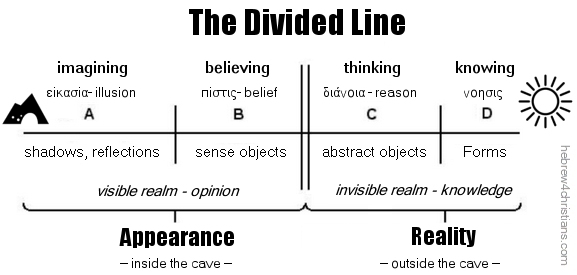 |
The Hebrew word for "world" or "age" is olam (עוֹלָם), which is derived from a root verb (עָלַם) that means "to conceal" or "to hide." God "hides" His face from us so that we will seek Him, and that means we must press through ambiguity to earnestly take hold of divine truth. Centuries before the time of the philosopher Plato, King David proclaimed that there was a "divided line" between the realm of the temporal world and realm of the hidden and eternal world. The temporal world is finite, subject to change, yet pointed beyond itself to an eternal world, which was the source of real significance, meaning, and life itself (2 Cor. 4:18). Therefore King David said, בַּקְּשׁוּ פָנָיו תָּמִיד/ bakeshu fanav tamid: "Seek His face continually" (Psalm 105:4). Note that the numerical value for the word "fanav" (i.e., "His face") is the same as that for the word "olam." When we truly seek God's face (i.e., His Presence) we are able to discern the underlying purpose for our lives.
דִּרְשׁוּ יְהוָה וְעֻזּוֹ
בַּקְּשׁוּ פָנָיו תָּמִיד
dir·shu · Adonai · ve·u·zo
ba·ke·shu · fa·nav · ta·mid

"Seek the LORD and his strength;
seek his presence continually."
(Psalm 105:4)

Download Study Card
Note that the ancient Greek version of the Torah (i.e., the Septuagint) translates this verse as, "Seek the LORD and be strengthened; seek His face through everything (διὰ παντός)." Unlike Plato, however, who "saw through" the temporal world and regarded it as less than real, King David understood that how we live within the intersection of these two realms revealed our inner character of faith -- and therefore our ultimate destiny....
Endurance and Suffering...

08.17.18 (Elul 6, 5778) "Pray that you may never have to endure all that you can learn to bear." Yes, though we must also believe that God "will not let us be tested beyond what we are able to bear, but with the test will also provide the way of escape (τὴν ἔκβασιν) so that we may be able to endure it" (1 Cor. 10:13). Indeed, in light of suffering what we really need is the blessing of perseverance, or what the New Testament calls hupomone (ὑπομονή), a word that means "remaining [μένω] under [ὑπο]" the Divine Presence while being tested (the English word "suffer" comes from the Latin word sufferre, from sub- (under) + ferre, to carry, and therefore denotes "bearing under" difficulty). Suffering people often do not need moral platitudes or correction from others, but rather the will to believe, the strength to stay constant, and the rise of hope that gives life to simple prayers that focus the heart upon the Lord's Presence: "God have mercy..." "Help me, O God..." "I need Thee, O Lord..." When we receive grace to faithfully suffer, we hear the Spirit whispering back to us: "Be not afraid..." "Live in me..." "Walk in the light..." "I am with you always..." "You are loved..."
רַבּוֹת רָעוֹת צַדִּיק
וּמִכֻּלָּם יַצִּילֶנּוּ יְהוָה
ra·boht · ra·oht · tza·deek
oo·mee·koo-lam · ya·tzee·le'·noo · Adonai

"Many are the troubles of a righteous person
but the LORD delivers him from them all"
(Psalm 34:19)
Life itself weans us from life as we learn that nothing ultimately belongs to us... We must learn to make peace with our sorrows and disappointments, to let go of them and to accept that this day, despite its frailty and trouble, is a precious gift from above. "My peace I give to you" (שלי שלום אני אתן לך), said Yeshua, "not as the world gives, I give to you" (John 14:27). Not as the world gives... When we let go, when we put everything in God's hands, we acknowledge that all we have is a gift from God.
Torah of Brokenness (תורה לב שבור)

08.16.18 (Elul 5, 5778) The old saying that "God helps those who help themselves" is completely wrong, since it relies upon the wrong source for strength. On the contrary, the truth is found the other way around: God helps those who cannot help themselves. Therefore spirituality necessarily involves an ongoing sense of irremediable brokenness, a feeling that you are not whole, that you are a mess, and that your need for God's healing is constant and relentless... Contrary to the ideals of proud humanism, spirituality is a state of "blessed neediness," of being "poor in spirit," that aches with inner desperation for God's power of healing. Those who humbly cry out to the LORD understand the human condition: "Woe is me, for I am ruined..." (Isa. 6:5). God hides from the eyes of the proud but is seen by the lowly of heart (James 4:6). As Yeshua said, "Everyone who exalts himself will be humbled, but the one who humbles himself will be exalted" (Luke 18:14). Take hold of hope, friend: It is surely the will of God for you to find strength in your weakness and comfort in your afflictions. His grace is sufficient (2 Cor. 12:9). As our Scriptures say, God is "the Father of Mercies and God of all comfort" (אַב הָרַחֲמִים וֵאלהֵי כָּל־נֶחָמָה). The Lord "comforts us" (lit., "calls us to His side," παρακαλέω) in our afflictions so that we may be able to comfort those who are afflicted with the same comfort with which we ourselves are comforted by God (2 Cor. 1:3-4).
קָרוֹב יְהוָה לְנִשְׁבְּרֵי־לֵב
וְאֶת־דַּכְּאֵי־רוּחַ יוֹשִׁיעַ

"The LORD is near to the brokenhearted
and saves the crushed in spirit"
(Psalm 34:18)
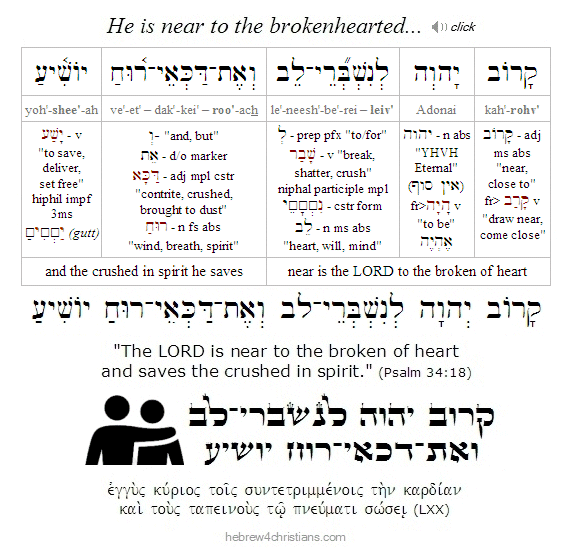 |
The Hebrew word "dakkah" (דַּכָּא) used in this verse is used to describe the suffering and crucifixion of our Messiah in Isaiah 53:5, 53:10, which suggests that there is a connection between our Lord's suffering and our own.... The questioning heart asks why must we suffer, especially in light of the cross of Messiah. Are we not healed by his stripes? Are we not made new? Yes indeed, though we are all called to share in his suffering during this present age (Col. 1:24). "For we know that the whole creation has been groaning together in the pains of childbirth until now, and not only the creation, but we ourselves, who have the firstfruits of the Spirit, groan inwardly as we wait eagerly for adoption as children, the redemption of our bodies" (Rom. 8:22-23). "Though our outer self is wasting away, our inner self is being renewed day by day; for this light momentary affliction (ἐλαφρὸν τῆς θλίψεως ἡμῶν) works within us more and more surpassingly for an eternal weight of glory (ὑπερβολὴν εἰς ὑπερβολὴν αἰώνιον βάρος δόξης κατεργάζεται ἡμῖν) beyond all comparison, as we look not to the things that are seen but to the things that are unseen; for the things that are seen are transient, but the things that are unseen are eternal" (2 Cor. 4:16-18). Meanwhile we are still broken vessels, we are slowly being turned to dust; our pains and our heartaches are real, and yet all these things are designed by heaven to help us grow for the glory and praise of God's Name. Brokenness distills the intentions of the heart by helping us to be more honest with ourselves. We begin to realize that we are more vulnerable than at first we thought; that our faith is not as strong as we imagined, and that our motives are often mixed and unconscious. Illusions are striped away; idols crumble; deeper levels of selfishness are uncovered; the gap between our words and our deeds is exposed... It is one thing, after all, to intellectually think about faith or to idealize spirituality, but it is quite another to walk out faith in darkness. Yet it is only there, in the rawness of heart, that we discover what we really believe and how our faith makes traction with reality. God uses momentary affliction to work within us an eternal weight of glory...
The Season of Teshuvah...

08.16.18 (Elul 5, 5778) The famous Danish philosopher Soren Kierkegaard once said that life must be lived forward, but it can only be understood backward, and consequently the present hour provides the only real opportunity you have to examine your soul... Therefore "repent one day before you die," and that day is today, since no one knows the day or the hour of his death. The midrash notes that the word Elul (אֶלוּל), when read backward, spells lulei (לוּלֵא), meaning "if not" or "were it not for...", which suggests that the last month of the Jewish year serves as a season to examine ourselves, to confess our sins, and to resolve to more completely turn toward the Divine Presence before the coming new year... Indeed the gematria (letter value) of the name Elul (1+30+6+30) is the same as the word binah (בִּינָה), "understanding," or the ability to discern between (בֵּין) truth and error. During this season of teshuvah, then, we ask the Lord to impart to us greater understanding about how to "live forward" by returning to him "bekhol levavkha," with all our hearts...
Spirituality and Honesty...

[ The unexamined life is not worth living, and indeed it is often a facsimile of a worthwhile life... The following is related to the month of Elul and the theme of teshuvah (repentance)... ]
08.16.18 (Elul 5, 5778) We are all on a spiritual journey, writing the "Book of our Life." To help us in the "writing" process, the Jewish sages decided that the month of Elul should be set aside as a season for cheshbon hanefesh (חֶשְׁבּוֹן הַנֶּפֶשׁ) - "making an account of the soul." This means that we engage in honest self-examination about our behavior. After all, what is the essence of teshuvah if it is not honesty with yourself? "For everyone who does wicked things (lit., ὁ φαῦλα, that which is "easy," "worthless," or "vain") hates the light and does not come to the light, lest his works should be exposed" (John 3:20). Therefore we make some time to reflect about our lives from the previous year. We ask searching questions like, "How did I get to this place in my life?" "Where am I now?" "Am I where I should be?" We engage in this process of self-examination with an aim to grow -- to let go of the pain of the past and move forward. Confession (i.e., homologia: ὁμολογία) means bringing yourself naked before the Divine Light to agree with the truth about who you are. Indeed, the related verb word "homologeo" (ὁμολογέω) literally means "saying the same thing" - from ὁμός (same) and λόγος (word). We need to confess the truth if we are to be free from the pain of the past. When King David wrote, יְהוָה אוֹרִי וְיִשְׁעִי מִמִּי אִירָ֑א - "The LORD is my Light and my salvation; whom shall I fear? (Psalm 27:1), he implied that he should even be free of fear of himself and of his past....
יְהוָה אוֹרִי וְיִשְׁעִי מִמִּי אִירָא
יְהוָה מָעוֹז־חַיַּי מִמִּי אֶפְחָד
Adonai o·ri ve·yish·i, mi·mi i·ra?
Adonai ma'oz-chay·yai, mi·mi ef·chad?

"The LORD is my light and my salvation; whom shall I fear?
The LORD is the stronghold of my life; of whom shall I be afraid?"

Hebrew Study Card
Being honest with ourselves is absolutely essential for any sort of authentic spiritual life... "No person is saved except by grace; but there is one sin that makes grace impossible, and that is dishonesty; and there is one thing God must forever and unconditionally require, and that is honesty" (Kierkegaard). Confession means "saying the same thing" about ourselves that God says - and that means not only acknowledging our various sins, transgressions, and iniquities, but also affirming our new identity as the beloved children of God. Saying that God doesn't love you is a lie as damning as denying His very existence...
Pursuing Rightousness (רדיפת הצדק)

[ The following entry concerns this week's Torah reading, parashat Shoftim. Please read the Torah portion to "find your place" here. ]
08.15.18 (Elul 4, 5778) Our Torah portion this week (parashat Shoftim) includes the famous statement: tzedek, tzedek tirdorf (צֶדֶק צֶדֶק תִּרְדּף): "Righteousness, righteousness, you shall pursue" (Deut. 16:20). The sages infer that the double mention of the word "righteousness" means that the pursuit of righteousness must itself be righteous. In other words, the end never justifies the means. God is not a pragmatist, and there are no "noble lies" for sake of the Kingdom of Heaven. The truth is gained only by truth, and therefore we may not use unjust methods even to promote a supposedly just cause.
צֶדֶק צֶדֶק תִּרְדּף
לְמַעַן תִּחְיֶה וְיָרַשְׁתָּ אֶת־הָאָרֶץ
אֲשֶׁר־יְהוָה אֱלֹהֶיךָ נתֵן לָךְ
tze·dek · tze·dek · tir·dof
le·ma·an · ti·che·yeh · ve·ya·rash·ta · et-ha·a·retz
a·sher · Adonai · E·lo·he·kha · no·ten · lakh

"Righteousness, righteousness, you must pursue;
so that you will live and inherit the land
that the LORD your God gives you."
(Deut. 16:20)

A related implication is that we should never be deceptive about promoting faith in God. We shouldn't flatter people, cajole them into believing, offer them vain hope, or misrepresent the truth of the message of the gospel. We should never promise people worldly happiness, prosperity, unending health, etc., in the name of religion, since this also is "means-to-end" reasoning. We must be clear about the demands of faith and the costs involved. And of course it is entirely forbidden to endorse violence of any kind (verbal or physical) to promote the cause of religion. Indeed, a sure mark of a false religion is to teach people to hate or even murder others "for God's sake..." Any religion that is based on "jihad-mentality" is therefore false and subject to fearful judgment from Almighty God.
Made Whole with God...

08.15.18 (Elul 4, 5778) In our Torah portion for this week (Shoftim) we read: "You shall be wholehearted with the LORD your God" (Deut. 18:13). Note that the word "wholehearted" in this verse (i.e., tamim: תָּמִים) is often translated as "perfect" or "blameless" in many Bible versions, though it is better to understand the word to connote being made "complete" or "whole." When God said to Abraham, "I am El Shaddai; walk before me and be tamim (Gen. 17:1), he was not saying "be perfect" or "don't ever make a mistake," but rather be fully engaged, that is, to walk before God passionately, sincerely, with all his heart, and by doing so to "walk out" the relationship with full assurance that he is accepted and beloved by God. Likewise when Yeshua said "Be therefore perfect as your Father who is in heaven is perfect" (Matt. 5:48), he meant that we should be complete, finished, and "made whole" by knowing and receiving the overflowing love and light of God.
תָּמִים תִּהְיֶה עִם יְהוָה אֱלהֶיךָ
ta·meem tee·he·yeh eem Adonai e·lo·hey'·kha

"You shall be whole with the LORD your God"
(Deut. 18:13)
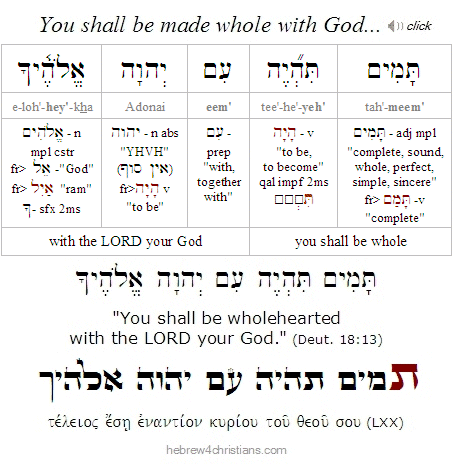 |
"You shall be wholehearted" is a mandate to know who you are, to know what is truly good as distinguished from what is evil, and to be united with God's passion to be healed from our ambivalence (δίψυχος). We are made "whole" or "perfect" (i.e., complete) when we resolutely turn to God for healing of what divides our hearts, as it says: "The Torah of the LORD is perfect (תָּמִים), returning the soul" (Psalm 19:8). Understand the Torah's commandment, then: "You shall be tamim (i.e., whole and wholehearted) with the LORD your God," to be a prophecy of transformation for your life, friend... May you know "the love of Messiah that surpasses knowledge, that you may be filled with all the fullness of God" (Eph. 3:19).
So how long will you go "limping" between two different opinions? How long will you live in the pain of a divided heart? Our Torah reading reminds us to make up our minds and return to the LORD and find wholeness.... In this connection note that where it is written, "Let us hear end of the matter: Fear God and love his commandments, the text adds: ki zeh kol-ha'adam (כִּי־זֶה כָּל־הָאָדָם), "for this is the whole man," suggesting that those who return will be healed of their double-mindedness (Eccl. 12:13). Ultimately we are made whole when we are united to God in Messiah, for then we are "with the LORD our God" and the Holy Spirit writes Torah within the heart of faith (Jer. 31:33). May God make us each "whole" in Him!
For more on this topic please see: "Make Up Your Mind: Further thoughts on Shoftim."
Spelling out "Teshuvah"

[ The Hebrew word "teshuvah" is often translated as "repentance," but what does that mean? ]
08.15.18 (Elul 4, 5778) Rabbi Sussya once said: "There are five verses in the bible that constitute the essence of the Torah. These verses begin in Hebrew with one of these letters: Tav (תּ), Shin (שׁ), Vav (ו), Bet (בּ), and Hey (ה), which form the word for repentance, "teshuvah" (תְּשׁובָה). The five verses are 1) Tamim tiheyeh (תָּמִים תִּהְיֶה): "Be wholehearted with God" (Deut. 18:13); 2) Shiviti Adonai (שִׁוִּיתִי יְהוָה): "I have set the LORD always before me" (Psalm 16:8); 3) Va'ahavta lere'akha (וְאָהַבְתָּ לְרֵעֲךָ): "Love your neighbor as yourself" (Lev. 19:18); 4) Bekhol derakekha (בְּכָל־דְּרָכֶיךָ): "In all your ways know Him" (Prov. 3:6); and 5) Higid lekha (הִגִּיד לְךָ): "Walk humbly with your God" (Micah 6:8).
הִגִּיד לְךָ אָדָם מַה־טּוֹב
וּמָה־יְהוָה דּוֹרֵשׁ מִמְּךָ
כִּי אִם־עֲשׂוֹת מִשְׁפָּט וְאַהֲבַת חֶסֶד
וְהַצְנֵעַ לֶכֶת עִם־אֱלהֶיךָ
hig·gid · le·kha · a·dam · mah · tov
u'mah · Adonai · do·resh · mi·me·kha
ki · im · a·sot · mish·pat · ve·a·ha·vat · che·sed
ve·hatz·ne·a · le·chet · im · e·lo·hey·kha

"He has told you, O man, what is good, and what the LORD requires of you:
Only to do justice, and to love kindness, and to walk modestly with your God"
(Micah 6:8)

Hebrew Study Card
In other words, "teshuvah" (repentance) is an acronym that stands for being wholehearted, seeing God, loving others, knowing God in all your journey, and walking in humility...
Torah of Miracles (תורה של נסים)
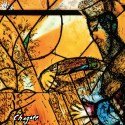
08.14.18 (Elul 3, 5778) Perhaps you (like me) once learned Psalm 19:7 as, "The law of the LORD is perfect, converting the soul." However, the Hebrew text might better be translated as, "The instruction (i.e., Torah) of the LORD is perfect, returning the soul." This is the message of teshuvah (תְּשׁוּבָה), or "repentance." We turn away from ourselves to discover that only the love of God given in Yeshua gives life to our dead hearts (Mark 1:15). Teshuvah is therefore first of all a matter of faith, of trusting in the miracle of God. And though it is indeed a great gift from heaven, it requires that we pass through the "narrow gate" of humility by confessing the truth about who we are (Matt. 7:13). We turn away from our pride; we acknowledge our inner poverty, our neediness, and we mourn over the loss and hurt caused by our sin. Teshuvah turns us away from our attempts to defend or justify ourselves and instead turns to God to heal our separation from love (Rom. 8:3-4). The miracle of love buries our old nature and transforms us into a new creation (2 Cor. 5:17).
תּוֹרַת יְהוָה תְּמִימָה מְשִׁיבַת נָפֶשׁ
עֵדוּת יְהוָה נֶאֱמָנָה מַחְכִּימַת פֶּתִי
to·rat · Adonai · te·mi·mah · me·shi·vat · nafesh
ei·dut · Adonai · ne·e·ma·nah · mach·ki·mat · pe·ti

"The Torah of the LORD is perfect, returning the soul
The testimony of the LORD is reliable, making wise the simple."
(Psalm 19:7)

Download Study Card
The Kotzker Rebbe is reported to have said, "There are miracles and then there are miracles... Some people regard as a miracle if God does someone's will; we regard as a miracle if someone does God's will." Amen, a true miracle - and one greater than the splitting of the sea - is that of a transformed heart that loves God and seeks to do God's will. Similarly, some people seek signs of the times and the End of the World, though the true "end of the world" arrives the moment you surrender your life to God's care...
The High Holidays Psalm...
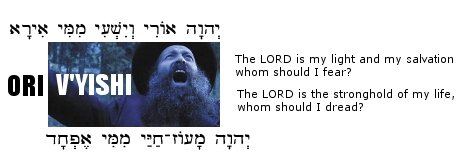
08.14.18 (Elul 3, 5778) It is an old custom to read (or to sing) the Book of Psalms (ספר התהילים) during the month of Elul. In the famous Song of Moses, it is written: וַיּאמְרוּ לֵאמר אָשִׁירָה לַיהוָה / "and they spoke, saying: 'I will sing to the LORD' (Exod. 15:1). This phrase can be formed into an acronym for Elul (אלול), and the sages therefore reasoned that hearing the Psalms were vital during the Season of Repentance and Days of Favor.
Of all the wonderful Psalms, however, Psalm 27 is considered the central one of the season of teshuvah. The midrash on the Psalms states that the word ori (אוֹרִי), "my light," refers to Rosh Hashanah (based on Psalm 37:6) whereas the word yishi (יִשְׁעִי), "my salvation" (lit. "my Jesus") refers to the atonement given on Yom Kippur. King David also mentions that God would hide him in his sukkah (בְּסֻכּה) in the time of trouble, referring to the holiday of Sukkot (Psalm 27:5). Therefore since it alludes to all three of the fall holidays, Psalm 27 is regarded as the thematic Psalm for the High Holidays of the Jewish year.
יְהוָה אוֹרִי וְיִשְׁעִי מִמִּי אִירָא
יְהוָה מָעוֹז־חַיַּי מִמִּי אֶפְחָד
Adonai · o·ri · ve·yish·i · mi·mi · i·ra
Adonai · ma·oz · chai·yai · mi·mi · ef·chad

"The LORD is my light and my salvation; whom shall I fear?
The LORD is the stronghold of my life; of whom shall I be afraid?"
(Psalm 27:1)

Hebrew Study Card
Finally, Psalm 27:13 contains a textual oddity. It is often translated: "Unless I had believed to see the goodness of the Lord in the land of the living." The word often translated "unless" is lulei (לוּלֵא), which read backwards spells Elul (אלול). This is said to suggest that salvation comes from faith that sees the goodness of the LORD. Repentance is only really possible if we believe in the goodness and love of the Lord "in the land of the living."
New Audio on Shoftim...
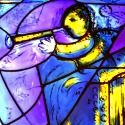
08.13.18 (Elul 2, 5778) I was able to complete the "Shavuah Tov" audio broadcast for parashat Shoftim today and it is now ready for online listening or download (see the links below). In this session I discuss both the 40 day "Season of Teshuvah" leading up to the Jewish High Holidays as well as our weekly Torah portion (i.e., parashat Shoftim) which discusses adjudication of legal matters among the people of Israel. In addition I look at Moses' great prophecy of "the Prophet" to come, namely the Messiah of Israel, and how that Prophet is clearly Yeshua as revealed in the New Testament writings. Throughout this broadcast I hope to encourage you to turn and draw near to God while there still is time...
God Our Light, Our Salvation...

08.13.18 (Elul 2, 5778) As we draw close to God and cleave to his heart, we will be delivered from the pain of our fears. The LORD becomes our Light and our Salvation, illuminating our steps despite the darkness and evil of olam ha'zeh, this present age (Psalm 119:105). As David said, Adonai ori v'yishi: "The LORD is my light and my salvation" – literally, my Jesus, my Yeshua – "whom shall I fear? The LORD is the refuge of my life, of whom shall I be afraid?" (Psalm 27:1). Yeshua is the Light of Life (אוֹר הַחַיִּים), the Healer of the fearful heart, the I-AM-WITH-YOU-ALWAYS One. His love overcomes all our fears. As the apostle Paul asked, "If God is for us, who can be against us?" (Rom. 8:31).
Yeshua is "the Voice of the Living God (קוֹל אֱלהִים חַיִּים) speaking from the midst of the fire" who understands the needs of His people. He is the Good Shepherd: "I have surely seen the affliction of my people who are in Egypt and have heard their cry... I know their sufferings" (Exod. 3:7; Heb. 4:15). A midrash says that the Ten Plagues were needed – not to convince Pharaoh that the LORD was God – but rather to convince the children of Israel of God's love! After all, without faith in that, Israel would never have ventured to leave Egypt. The same could be said of the greater judgment to come upon this world. The ultimate purpose of yissurei ahavah (יִסּוּרֵי אַהֲבָה) "the troubles of love," is to turn us away from the source of what keeps us in bondage. As we hear the "footsteps of the Messiah" approaching nearer, let us heed the words of our Messiah and Savior: "when you see these things taking place, you know that the time is near, right at the door" (Mark 13:29), and let us then appeal to others to "wake up!" "come alive!" Awake thou that sleepest - arouse from a state of slumber and arise from the dead (Eph. 5:14). The message to the sinner is always, "Wake up - you are living a nightmare..." There is only one remedy.
יְהוָה אוֹרִי וְיִשְׁעִי מִמִּי אִירָא
יְהוָה מָעוֹז־חַיַּי מִמִּי אֶפְחָ
Adonai o·ri ve·yish·i, mi·mi i·ra
Adonai ma·oz chai·yai, mi·mi ef·chad

"The LORD is my light and my salvation; whom shall I fear?
The LORD is the stronghold of my life; of whom shall I be afraid?"
(Psalm 27:1)

Download Study Card
Psalm 27 is the "High Holiday Psalm" in Jewish tradition. The midrash Shocher Tov states that the word ori (אוֹרִי), "my light," refers to Rosh Hashanah (based on Psalm 37:6) whereas the word yishi (יִשְׁעִי), "my salvation," refers to the atonement given on Yom Kippur (and of course to Yeshua our Eternal Kapparah: הַכַּפָּרָה הַעוֹלָם). King David also mentions that God would hide him in his sukkah (בְּסֻכּה), referring to the holiday of Sukkot (Psalm 27:5). Since all three holidays are alluded to in this Psalm (Rosh Hashanah, Yom Kippur, and Sukkot), Psalm 27 is regarded as the thematic hymn for the Fall Holidays of the Jewish year. Yeshua is our Light and our Salvation, the One who says, "It is I; be not afraid" (John 8:12; Mark 14:27; etc.).
Chodesh Tov Elul...

08.12.18 (Elul 1, 5778) The word "Elul" (אֱלוּל) is said to be an acronym for the phrase, ani le'dodi ve'dodi li (אֲנִי לְדוֹדִי וְדוֹדִי לִי), "I am my beloved's, and my beloved in mine" (Song 6:3), to encourage us to return to God, to become full of desire for the Beloved of our soul. We are likened to empty vessels in need of oil, and the call to teshuvah moves us to seek to be filled with the Spirit of God's love and kindness. Indeed, the Spirit takes us into the desert places to reveal to us our need (Deut. 8:3; Jer. 2:2; Luke 4:1). "Blessed are those who hunger and thirst for righteousness, for they shall be filled" (Matt. 5:6).
אֲנִי לְדוֹדִי וְדוֹדִי לִי
הָרעֶה בַּשׁוֹשַׁנִּים
a·nee · le·doh·dee · ve·doh·dee · lee
ha·roh·eh · ba·shoh·sha·neem

"I am my beloved's and my beloved is mine;
he pastures among the lilies."
(Song 6:3)

Download Study Card
This verse is sometimes linked to the "lilies" (i.e., shoshanim: שׁשַׁנִּים) mentioned in Psalm 45, which presents a Messianic vision of the Divine Bridegroom and offers an "ode" for a forthcoming heavenly wedding: "Hear, O daughter, and consider, and incline your ear: forget your people and your father's house, and the king will desire your beauty. Since he is your lord, bow to him" (Psalm 45:10-11). Soon the LORD will return for His betrothed, and then we will finally celebrate the great "marriage" with our King...
God wants us to seek him, to yearn for him, and to desire him... he sings out to our hearts in love. Interestingly, where it says: אֲנִי לְדוֹדִי וְדוֹדִי לִי הָרעֶה בַּשׁוֹשַׁנִּים, we can read, "I am for my beloved, and my beloved is for me, the Shepherd (הָרעֶה) among the lilies." Where is your Shepherd? Among the flowers... in a place of love and beauty set for you.
Cleansing from Hidden Sins...

08.12.18 (Elul 1, 5778) The advent of the month of Elul marks the beginning of the "Forty Days of Teshuvah" leading up to Yom Kippur. This is a season of introspection and teshuvah (i.e., "repentance") whereby we seek to turn our hearts to God and to attune ourselves to what is most important. This is not a trivial task but requires courage and the willingness to be genuinely honest with ourselves... All of us have unhealed parts, "hidden faults" of which we are not fully aware. Therefore king David prayed, "Who can discern his errors? cleanse me from secret faults" (Psalm 19:12). We are cleansed by confession, that is, by looking within our hearts to uncover deeper motivations... If we are honest with ourselves we may discover, for example, that we are angry or fearful people, despite how we otherwise wish to regard ourselves. If you find yourself unable to let something go, for instance, some pain or failure of the past, remind yourself that you must do so if you want to move on with your life. Focusing on how things could have been different is to be enslaved to the past. The goal of teshuvah (repentance) is to turn us back to God for life, but to do this, we must be be willing to let go of what makes us sick.
שְׁגִיאוֹת מִי־יָבִין מִנִּסְתָּרוֹת נַקֵּנִי
גַּם מִזֵּדִים חֲשׂךְ עַבְדֶּךָ
אַל־יִמְשְׁלוּ־בִי אָז אֵיתָם
וְנִקֵּיתִי מִפֶּשַׁע רָב
she·gi·ot · mi-ya·vin · min·nis·ta·rot · nak·kei·ni
gam · mi·ze·dim · cha·sokh · av·de·kha
al-yim·she·lu-vi · az · e·tam
ve·ni·ke·ti · mi·pe·sha · rav

"Who can discern his errors? Cleanse me from secret faults;
Keep back your servant also from presumptuous sins;
let them not have dominion over me! Then I shall be blameless,
and innocent of great transgression." (Psalm 19:12-13)

Note that the Hebrew word translated "errors" (i.e., shegi'ot: שְׁגִיאוֹת) comes from a root word (שָׁגָה) that means to wander, stray, err, or transgress. The question raised by King David is of course rhetorical: "Who can discern his errors?" The answer is no one – apart from divine intervention... David therefore asked to be cleansed from his "secret faults" (נִּסְתָּרוֹת) which are not those that were performed by him "in secret," but rather those that were unknown, unseen, and unconscious to his own sense of awareness. These are "mindless" sins, unthinking offenses, hidden dispositions, character traits and actions that a person unwittingly performs, perhaps because of deep forces of which he was oblivious. These are the "secret sins" set in the light of God's face (Psalm 90:8); the "sluggish darkness" of the human heart that leads to death and ruin: "The heart is deceitful above all things, and incurably sick; who can understand it?" (Jer. 17:9). How many of us, after all, are fully aware of what we are doing when we are doing something? How many of us are completely transparent both to ourselves and before God, with no unclear motives, etc.? We must always be vigilant... There is always the force of habit, or the subconscious desires or conflicts of the inner life, that work on us, not to mention the trauma of our past and the present devices from the enemy of our souls. May the LORD give us the willingness to be healed, even if there are parts of ourselves that seem to resist that healing.
Note further that "presumptuous" sins (מִזֵּדִים) are not necessarily flagrant sins as much as those that arise from self-reliance or pride (זָדוֹן). Only the humble of heart can be truly free from the dominance of presumption and sin. "Keep steady my steps according to your promise, and let no iniquity get dominion over me" (Psalm 119:133). May God make us humble of heart, free from presumption and the illusion that we do not need God for every step we take. Therefore may it please the Lord to heal those parts of ourselves that don't even know they need to be healed... Amen.
בָּרוּךְ יְהוָה הַמְּרָפֵא אֵת חֲטָאֵנוּ הַנִּסְתָּרִים
ba·rukh · Adonai · ha·me·ra·fei · et · cha·ta·ei·nu · ha·nis·ta·rim

"Blessed is the LORD who heals our hidden sins."

Parashat Shoftim - שופטים

[ Rosh Chodesh Elul Tov, friends, and welcome the Forty Days of Teshuvah! May we we all draw near to the LORD God our Savior during this Season of Return: Amen. ]
08.12.18 (Elul 1, 5778) Our Torah reading for this week (parashat Shoftim) begins with the commandment that the people of Israel should appoint judges (i.e., shoftim: שׁפְטִים) and officers (i.e., shoterim: שׁוֹטְרִים) so that justice would be enforced throughout the promised land (Deut. 16:18). The call for justice is famously stated as, "tzedek, tzedek tirdof" (צֶדֶק צֶדֶק תִּרְדּף): "Justice, Justice you shall pursue" (Deut. 16:20). The word tzedek means "righteousness" and involves the duty to adhere to moral truth. Throughout the Torah portion the theme of social justice predominates, as the ethical characteristics for judges are defined, as well as for elders, kings, prophets, and priests, all of whom are responsible for maintaining a just and healthful society. As the prophet wrote: "The work of righteousness (tzedakah) shall be peace" (וְהָיָה מַעֲשֵׂה הַצְּדָקָה שָׁלוֹם), and added that "the service of righteousness (וַעֲבדַת הַצְּדָקָה) shall be quietness and security forever" (Isa. 32:17).
בִּרְבוֹת צַדִּיקִים יִשְׂמַח הָעָם
וּבִמְשׁל רָשָׁע יֵאָנַח עָם
bir·vot · tzad·di·kim · yis·mach · ha·am
u·vim·shol · ra·sha · ye·a·nach · am

"When the righteous increase, the people rejoice,
but when the wicked rule, the people groan."
(Prov. 29:2)

Regarding making judgments about others we should try to always extend the benefit of the doubt (i.e., kaf zechut, "the hand of merit"). When we judge mercifully and in accord with the truth, the Divine Presence joins us, but if we act corruptly, we "push" the Presence away and create a sense of exile. Yeshua told us to "whatever you wish that others would do to you, do also to them, for this is the Law and the Prophets" (Matt. 7:12). In other words, as we judge others, so we are judged ourselves. We must be careful to avoid rationalizations or to fool ourselves... Looking at others from a selfish perspective is ultimately a form of "bribery" that blinds us to the truth about righteousness (see Deut. 16:19).
"Justice, Justice you shall pursue" (Deut. 16:20). Tzedek, tzedek tirdof also means that justice must be pursued in a just manner, that is, the methods we use to obtain justice must themselves be just. The Scriptures therefore do not advocate pragmatism or utilitarian thinking. There are no "noble lies" in the Kingdom of Heaven. Violence (verbal or physical) or deception done in the name of God is always a bad idea and will be judged by the LORD. We must execute great restraint and caution when we confront oppression in the world. If you want to change the world around you, begin with yourself....
Returning Back Home...

[ The month of Elul begins at sundown tonight, the start of the 40 days of teshuvah leading up to Yom Kippur... Chodesh tov chaverim! ]
08.10.18 (Av 29, 5778) The following parable speaks of the season of teshuvah: A king's son was at a far distance from his father. Said his friends to him, "Return to your father." He said, "I can't: the way is too far. His father sent word to him and said, "Go as far as you are able, and I will come the rest of the way to you. Thus says the Holy One, blessed be He, to his faraway children: "Return to Me, and I will return to you."
שׁוּבוּ אֵלַי וְאָשׁוּבָה אֲלֵיכֶם
אָמַר יְהוָה צְבָאוֹת
shoo·voo · e·lai · ve·ah·shoov·ah · a·ley·khem
ah·mar · Adonai · tze·vah·oht

"Return to me, and I will return to you,
says the LORD of hosts" (Mal. 3:7)

It is never too late to turn to God... there is always hope. The prophet Jeremiah spoke in the Name of the LORD: "Return, faithless Israel, declares the LORD. I will not look on you in anger, for I am kind (כִּי־חָסִיד אֲנִי), declares the LORD" (Jer. 3:12). When the people drew back in shame, however, God encouraged them by saying "My children, if you return, will you not be returning to your Father? Return, O faithless sons; I will heal your faithlessness. "Behold, we come to you, for you are the LORD our God."
Pilgrimage in a Circle...
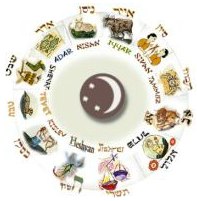
[ Sundown tonight is Rosh Chodesh Elul, the start of the month of Elul and the 40 day countdown to Yom Kippur. May weheed God's voice and turn to Him -- while there is still time.... shalom! ]
08.10.18 (Av 29, 5778) Our Torah reading this week (i.e., Re'eh) concludes with the commandment to make three "pilgrimage festivals" (i.e., shelosh regalim) each year: Passover, Shavuot (Pentecost), and Sukkot (Tabernacles). In the Torah, these "holidays" are called "appointed times" (i.e., mo'edim: מוֹעֲדִים), a word which comes from a root meaning witness (עֵד). Other words formed from this root include edah (עֵדָה), a congregation, edut (עֵדוּת), a testimony, and so on. The related verb ya'ad (יָעַד) means to meet, assemble, or even to betroth. The significance of the holy days, then, is for the covenant people of the LORD to bear witness to God's love and faithfulness by revisiting our history and by looking forward to their ultimate fulfillment, when we no longer pass through this world but abide in the heavenly reality. Meanwhile we trust in God's prophetic plan as revealed in the holy calendar, and observe the seasons as he has commanded. As it says, "All the paths of the LORD are love and truth to the ones guarding His covenant and His testimonies."
כָּל־אָרְחוֹת יְהוָה חֶסֶד וֶאֱמֶת
לְנצְרֵי בְרִיתוֹ וְעֵדתָיו
kol · or·chot · Adonai · che·sed · ve·e·met
le·no·tze·rei · ve·ri·to · ve·e·do·tav

"All the paths of the LORD are compassion and truth
for those who keep His pledge and His testimonies."
(Psalm 25:10)

Hebrew Study Card
Metaphorically the "paths of the Lord" (i.e., orchot Adonai: אָרְחוֹת יְהוָה) are likened to ruts or grooves created by the wheels of a caravan (i.e., orchah: אוֹרחָה) passing repeatedly over the same ground. These paths signify the Divine Presence journeying with God's children in this world. In temporal terms, we are able to discern the path by means of the divine calendar. God's love and faithfulness attend to His covenant (i.e., brit: בְּרִית, "pledge" or promise) and to the commemorations of the yearly "appointed times" (i.e., mo'edim: מוֹעֲדִם) which testify to God's love and faithfulness. Keeping God's testimonies, then, means that we will be careful to observe the biblical holidays in order to witness to God's truth... Shabbat Shalom and Chodesh Elul tov, chaverim!
Shababt Shalom and Chodesh Elul Tov, dear friends. May this coming Season of Teshuvah be one where we all draw closer to the LORD our God... Amen.
Seeing Moral Reality...

08.10.18 (Av 29, 5778) Our Torah portion (Re'eh) exhorts us to see clearly – to focus the will – by understanding that our choices have spiritual consequence, and that we are responsible for what we choose. "Re'eh - see!" Open your eyes and apprehend that there is overarching moral reality before which we are infinitely accountable. Therefore we are commanded first to see, because without clear vision we will be unable to discern what is a blessing and what is a curse – that is, we will be blind to the effect our choices have in our lives (Prov. 29:18). Therefore choose this day, and choose life (בָּחַרְתָּ בַּחַיִּים)! Look and know there is good and there is evil, there is the sacred and the profane; there is real blessedness and loss... God will never allow us to be indifferent to Reality. We can (and we must) choose, and if we should regard ourselves as powerless, we deny the truth of our freedom – we turn away from possibility and become enslaved to a victim mentality.... You cannot opt out of responsibility for your choices, since not choosing is itself a choice, and therefore are "forced to be free" - and bear the consequences of how we live.
בְּאֵין חָזוֹן יִפָּרַע עָם
וְשׁמֵר תּוֹרָה אַשְׁרֵהוּ
b'ein · cha·zon · yip·pa·ra' · am
ve·sho·mer · to·rah · ash·rei·hu

"Where there is no vision, the people cast off restraint,
but the one who keeps Torah is made happy" (Prov. 29:18).

Download Study Card
Knowing who you are...
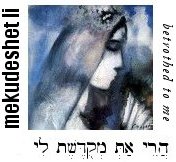
[ The following entry concerns this week's Torah reading, parashat Re'eh: "See!" ]
08.10.18 (Av 29, 5778) One of the greatest mistakes is to forget the message of who you really are and your beloved status before the LORD... "Fear not, for I have redeemed you; I have called you by name, you are mine" (Isa. 43:1). Forgetting who you are leads to forgetting who the LORD is, just as forgetting who the LORD is leads to forgetting who you are... A verse from our Torah reading this week speaks to us along these lines: "You are children of the LORD your God (בָּנִים אַתֶּם לַיהוָה אֱלהֵיכֶם). You shall not cut yourselves for the dead. For the LORD has chosen you to be for him a treasured people (עַם סְגֻלָּה) out of all the peoples who are on the face of the earth" (Deut. 14:1-2). God regards us as his beloved children, and therefore we trust him as a child trusts his father. We may not always understand all that our father does, but we have complete faith in his good will toward us, even in the face of death itself. We do not engage in self-destructive mourning, then, because we are treasured by God and we trust in God's promises for eternal life (John 11:25). Because of this, Jewish halachah (legal custom) puts limits to grieving practices. Excessive mourning, interminable gloom, self-destructive anger, or the refusal to let go of our fear may indicate a lack of faith in God's care as our Father. Remember where it says "God works all things together for good," for that includes even physical death... Let us therefore "hope to the LORD (קַוֵּה אֶל־יְהוָה); be strong and strengthen our heart; and (again) let us hope to the LORD" (Psalm 27:14).
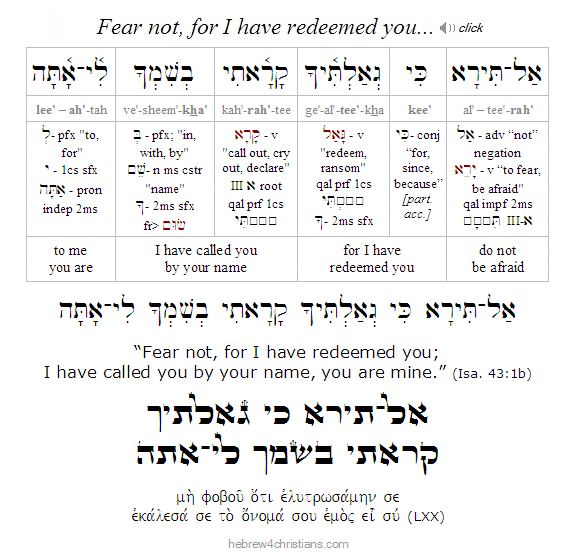 |
Note: For more on this very important topic, please see the article "Am Segulah."
Choosing the Blessing...
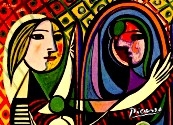
[ The following entry concerns this week's Torah reading, parashat Re'eh: "See!" Please read the Torah portion to "find your place" here. ]
08.10.18 (Av 29, 5778) Our Torah portion for this week begins, "See! I am setting before you today a blessing (בְּרָכָה) and a curse (קְלָלָה)" (Deut. 11:26). The message of Re'eh is that every moment presents us with the real possibility to see the sacred, the holy, and the good... The blessing comes when we focus on God and allow His Spirit to guide us, though the curse comes when we go after other gods that we "have not known" (Deut. 13:3). These "alien passions" distract us and separate us from the true Divine Presence, and this leads to the "works of the flesh" (i.e., addictions, cravings, uncontrollable passions, etc.). Seeking after "other gods" is to experience exile, trouble, and separation from YHVH, who is the Source of healing and love. When we walk in the Spirit we experience the blessing and are made free of the law of sin and death (Gal. 5:16-24).
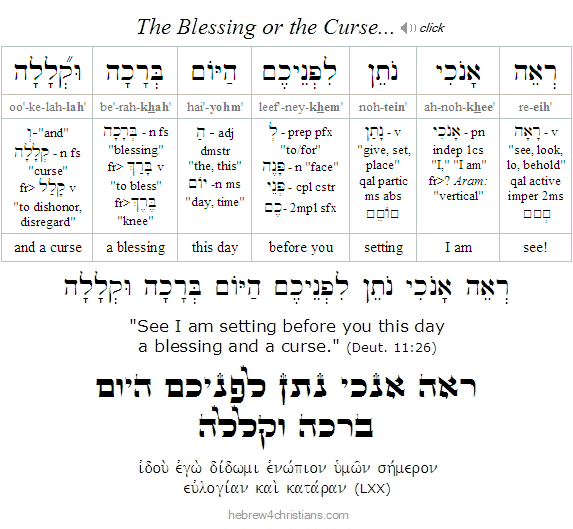 |
HaMakom - the Place of God
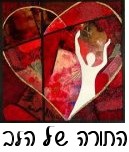
[ The following entry concerns this week's Torah reading, parashat Re'eh: "See!" ]
08.09.18 (Av 28, 5778) "But you shall seek the place (הַמָּקוֹם) that the LORD your God will choose... there you shall go" (Deut. 12:5). This indicates the primacy of seeking: you must first seek "the place" and then you can go... The sages note that the gematria for this verse is the same as "You shall therefore lay up these words of Mine in your heart and in your soul..." (Deut. 11:18), which again reveals that the Divine Presence, "HaMakom" (הַמָּקוֹם), is manifest within the place of our hearts... If we seek God with all our hearts we will "come there," and we will find Him there. Our yearning for God leads us to the place of His Presence, as it says: "Open to me the gates of righteousness (שַׁעֲרֵי־צֶדֶק), that I may enter through them and give thanks to the LORD" (Psalm 118:19). It is our heartache, our hunger, thirst, and our yearning for love that opens the gate to come before God. Praise the LORD - His heart is the place we truly need...
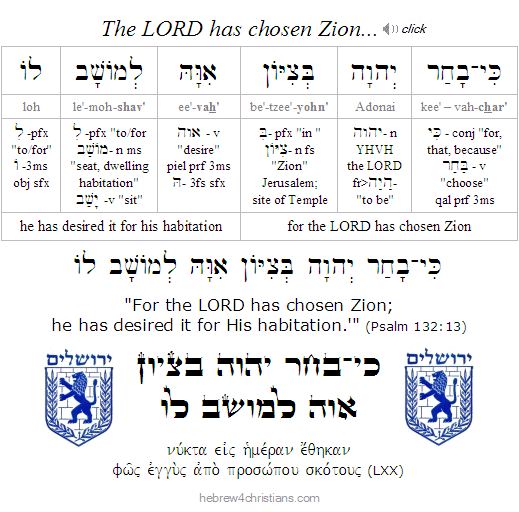 |
Of the "Place of God" (הַמָּקוֹם) the Torah says "that I may dwell in their midst" (Exod. 25:8), which can be translated as "that I may dwell within them," indicating that the point of the Tabernacle was to bring God within the hearts of His people... We must create a place within our hearts, in other words, for God to dwell within us. Yeshua likewise told us that we would experience peace and joy when we "abide in Him." Note that the numeric value of the word mishkan (מִשְׁכָּן) is the same as the word shema (שְׁמַע), "hear" or "listen" (Deut. 6:4). When we really stop to listen to the LORD, we will find His glorious and loving Presence...
Teshuvah of Mercy (תשובה של רחמים)

08.09.18 (Av 28, 5778) It's been said that grace is getting what you don't deserve, whereas mercy is not getting what you do... Yeshua said, "Blessed are the merciful (μακάριοι οἱ ἐλεήμονες), for they shall receive mercy" (Matt. 5:7). This is not a reciprocal law like karma, i.e., you get in return what you first give, since we cannot obtain God's mercy as reward for our own supposed merit (Rom. 4:4). No, we are able to extend mercy to others when we are made merciful ("full of mercy"), that is, when we first receive mercy from God. After all, you can't give away what you don't have, and if we have no mercy for others, it is likely that we have not received it ourselves, as the parable of the Good Samaritan reveals (Luke 10:25-8). Your forgiveness is your forgiveness: as you forgive, so you reveal your heart. What you do comes from what you are, not the other way around. We are first transformed by God's grace and then come works of love. We are able to judge others mercifully, with the "good eye," because we come to believe that we are beloved by God.
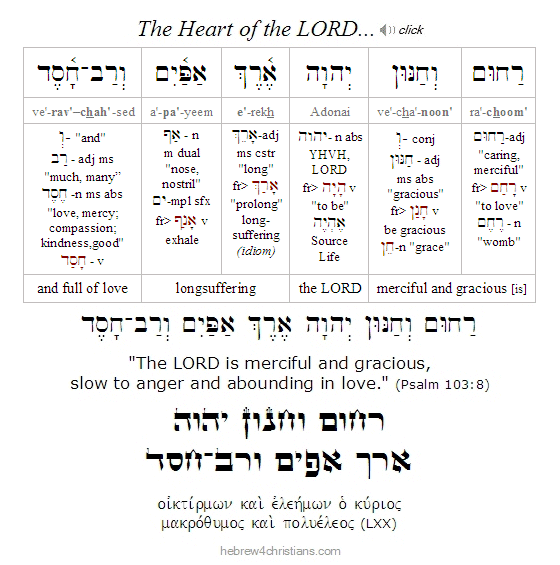 |
The pattern therefore abides: First you realize you are broken, impoverished of heart, and you therefore mourn over your sinful condition. Then you hunger and thirst for God's righteousness, for his healing and deliverance, and you learn to trust the mercy of God, that is, you come to accept that you are accepted despite your unacceptability. You begin to show yourself mercy; you learn to "suffer yourself" and forgive your own evil, and then you extend this mercy to others who are hurting around you... The failure to extend mercy, to demand your "rights" or hold on to grudges, implies that you are relating to God as Judge rather than as Savior (James 2:13). If we condemn what we see in others, we have yet to truly see what is within our own hearts; we have yet to see our desperate need for God's mercy for our lives. If you don't own your own sin, your sin will own you. Being merciful is a response to God's love and therefore is essential to genuine teshuvah... Ask the LORD to help you let go of the pain of the past by being full of mercy toward yourself and others.
Torah of a Good Eye (תּוֹרָה שֶׁל עַיִן טוֹבָה)

08.08.18 (Av 27, 5778) Our Torah for this week (i.e., parashat Re'eh) directs us to look with compassion upon the needy and to suppress our selfish impulses: "Take heed lest there be an unworthy thought in your heart ... and your eye look grudgingly on your poor brother, and you give him nothing, and he cry to the LORD against you, and you be guilty of sin (Deut. 15:9). The Hebrew verb translated "take heed" is an imperative urging us to be careful about how we think, since our thoughts affect our hearts, and our hearts affect our choices and actions. Suspicious or cynical thoughts are a symptom a hard heart, that is, a "difficult" heart that has trouble feeling sympathy for others. Note that the word translated "unworthy" (in the phrase "unworthy thought") is beli'al (בְּלִיַּעַל), which, according to Samson Raphael Hirsch, derives from the preposition be'li (בְּלִי), meaning "without," and ya'al (יַעַל), meaning "to progress," suggesting thinking that is feckless, stunted, profane, and useless. Worthy thinking, on the other hand, is fruitful as looks for the good in others and extends chesed, as it is written: ῾Η ἀγάπη ...οὐ λογίζεται τὸ κακόν, "love does not think evil" (1 Cor. 13:5) and ῾η ἀγάπη συγχαίρει δὲ τῇ ἀληθείᾳ, "love rejoices in the truth" (1 Cor. 13:8).
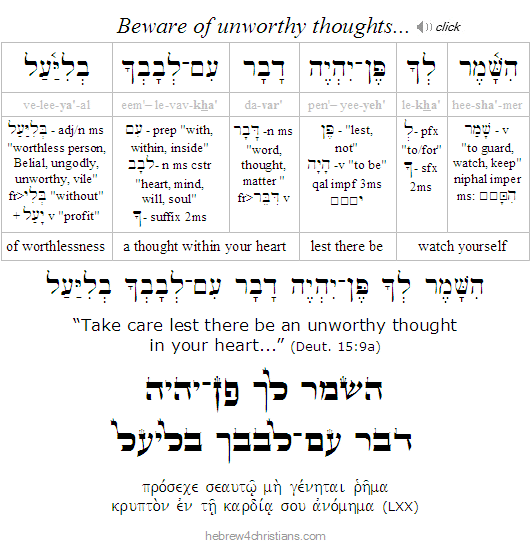 |
The LORD wants us to be willing to help others who are in need... Regarding the case of a poor brother Torah says: "You shall give to him freely (i.e., naton titten lo: נָתוֹן תִּתֵּן לוֹ, "giving you shall give") and your heart shall not be grudging when you give to him, because for this reason the LORD your God will bless you in all your work and in all that you undertake" (Deut. 15:10). Don't miss the connection here: you are blessed in order to give to those in need. Moreover, the Scripture promises that "whoever is generous to the poor lends to the LORD, and he will repay him for his deed" (Prov. 19:17; cp. Prov. 28:27).
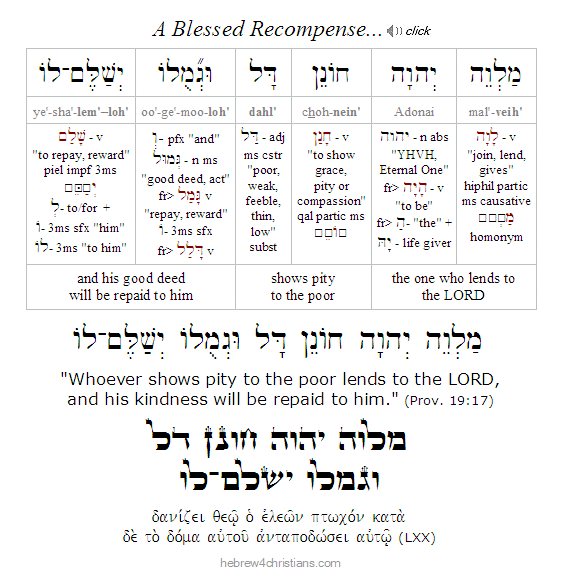 |
We read: "Whoever diligently seeks good seeks favor, but evil comes to him who searches for it" (Prov. 11:27). The one who seeks good is called shocher tov (שׁחֵר טוֹב), "a seeker of good." The shocher tov uses the "good eye" (i.e., ha'ayin ha'tovah: הַעַיִן־הַטּוֹבָה) to see worth and potential in others. The one who searches out evil, on the other hand, is called doresh ra'ah, "a searcher of evil." The doresh ra'ah has an evil eye (ayin ha'ra) that is stingy, critical and faultfinding. The proverb may therefore be stated this way: When you seek the good of others, you will find God's favor (ratzon), but when you search for evil in others, it becomes your own. As the Baal Shem Tov once said, "When we see faults in others, we must understand that they only reflect the evil within ourselves." Likewise King David said, וּתְפִלָּתִי עַל־חֵיקִי תָשׁוּב, "my prayer shall turn back upon my breast" (Psalm 35:13). Some prayers are conscious words spoken to God, whereas others are expressions of heart attitudes. Our proverb teaches that when we harbor indifference, ill will, or resentment toward others, we hurt ourselves; when we favor others and desire their blessing, on the other hand, we will find God's favor and blessing. טוֹב־עַיִן הוּא יְברָךְ - "The one with the good eye will be blessed" (Prov. 22:9; Matt. 6:22).
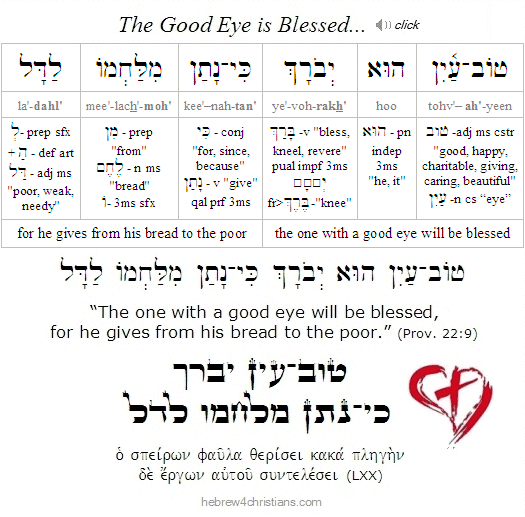 |
The heart looks through the eye.... A good eye (i.e., ayin tovah: עַיִן טוֹבָה) - sometimes called a "beautiful eye" (עין יפה) - refuses to think evil about others (it "does not impute the bad" - οὐ λογίζεται τὸ κακόν - as in 1 Cor. 13:5), but it rejoices in the truth – even if such truth is found only in the hope of a future good (1 Cor. 13:7). The good eye is the instrument of a giving heart that looks upon the needs and pains of others with genuine compassion. An "evil eye" (i.e., ayin hara: עַיִן רָעָה), on the other hand, is cynical, jaded, envious, and unsympathetic to other people and their struggles... Using a good eye takes from the treasure within the heart and gives it out freely to others: "The good person out of his good treasure brings forth good, and the evil person out of his evil treasure brings forth evil" (Matt. 12:35). There never is a risk that true compassion may be given away without warrant from heaven. In the future judgment to come, I'd rather be found guilty of "casting pearls before swine" than to be found guilty of withholding love from others...
A person with a "good eye" looks at things from the perspective of love. It beholds all circumstances -- and especially other people -- and invariably finds something worthy and beautiful.... "Whoever sows sparingly will also reap sparingly, and whoever sows bountifully will also reap bountifully" (2 Cor. 9:6). As we give, so we are given... Therefore the "Torah of a Good Eye" (תּוֹרָה שֶׁל עַיִן טוֹבָה) teaches that "whatever is true, whatever is honorable, whatever is just, whatever is pure, whatever is lovely, whatever is commendable, if there is any excellence, if there is anything worthy of praise, think about these things" (Phil 4:8).
The Meaning of Shalom...

08.07.18 (Av 26, 5778) In our Torah reading for this week (i.e., parashat Re'eh) it is written: "You shall not worship the LORD your God in that way" (Deut. 12:4), which here refers to Canaanite practices of idolatry that were based on mystery and superstition. Unlike these religious cults that were based on vain speculations, however, the Jews were duty-bound to carry out God's will as expressed by the truth of divine revelation. Our father Abraham was given revelation of Torah (Gen. 26:5) and at Sinai moral truth was enshrined in the Ten Commandments (Exod. 24:12; Deut. 5:22). A basic assumption of Torah therefore is that "ought implies can," or that we are genuinely responsible to know and to do moral truth. Unlike the ancient "mystery religions" that abandoned themselves by "celebrating" the lower nature, the Torah insists on overruling our base impulses and finding peace in the midst of the struggle to walk in righteousness. Therefore we do not understand the Hebrew word "shalom" (שָׁלוֹם), or "peace," to simply mean the absence of strife, but rather "wholeness," "completeness," "healing" -- the integration of the heart and mind that comes through catharsis and personal struggle (Gen. 32:28). Faith does not mean passivity, but protest -- "arguing" for (and even sometimes arguing with) heaven, reminding God of his promises, lamenting over the divine absence; finding courage to oppose the status quo, and repeatedly appealing to heaven "be'khol levaveinu" (בְּכָל־לְבָבֵנוּ) -- with all our hearts -- precisely because we believe that our prayers can affect even the divine decrees... True faith confesses to "move mountains into the sea" (Mark 11:23) and refuses to let go of God until it receives the promised blessing to become "Israel" (Gen. 32:26).
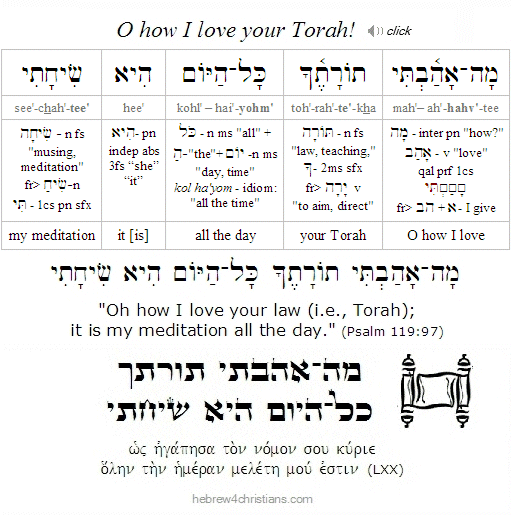 |
Choosing to See...

08.07.18 (Av 26, 5778) This week's Torah portion (i.e., Re'eh) begins with the portentous words: "See (רְאֵה), I give before you today a blessing and a curse, the blessing, if you obey the commandments of the LORD your God, which I command you today, and the curse, if you do not obey the commandments of the LORD your God, but turn aside from the way that I am commanding you" (Deut. 11:26-28). In the Hebrew text we notice that the word re'eh is singular ("you see!"), whereas the following pronoun is plural ("before you today") which stresses that though Torah is freely given to everone "who has ears to hear," it's our own personal responsibility to "choose life" and walk its message out in our lives (Deut. 30:19). This has traditionally been understood to mean that God gives each of us the path of goodness (that leads to blessing) and the path of wickedness (that leads to curse). The path we are are choosing, in other words, is ultimately our own choice...
This is an Either/Or of the heart, and there is no place for compromise in this decision. Moreover, since your life is part of a greater whole, you must understand that every deed you do brings to the world around you either a blessing or a curse.... To "correct" the world you live in (תיקון עולם), you must first correct yourself (Matt. 7:5).
An undisputed maxim of the Talmud is: "All is in the hands of God except the fear of heaven (yirat shamayim)" (Berachot 33b; Niddah 16b). In other words, though God constantly showers the world with grace and light, He does not "force" us to revere His Presence but rather leaves that choice with us. God could overwhelm us all so that we had no choice but to see and fear Him, but He "withdraws" Himself and restrains His influence in our lives so that we can exercise faith. The Hebrew word for seeing (ראה) and the word for fearing (ירא) share the same root. We cannot genuinely "choose life" apart from personally seeing it, but we cannot see it apart from the reverence of God. The reverence of God sanctifies our perception and enables us to see clearly. Therefore we understand that the righteous "walk by faith, not by sight" (2 Cor. 5:7).
For more on this topic see: "Choosing to See: Further thoughts on parashat Re'eh."
Seeing the Blessing...

[ The following is related to our Torah reading for this week, parashat Re'eh.... ]
08.07.18 (Av 26, 5778) "See, I am giving... the blessing (הַבְּרָכָה) when you hearken (i.e, shama: שָׁמַע) to the commandments of the LORD your God which I command you today" (Deut. 11:26-27). Do not understand this as referring to blessing that results from hearing God's word, but rather the blessing that enables you to hear it in the first place... That is the blessing of being made awake, alive, and attuned to the Spirit of God. In this world you may or may not receive material blessing as you heed the truth, though you assuredly will be sustained by God's ongoing care (Psalm 37:25). The heavenly blessing is always present before you, however, when you sincerely turn to God and seek to do his will. And may it please the LORD our God to help us turn to Him now, in this hour...
"Blessed be the God and Father of our our Lord Yeshua the Messiah, who has blessed us in Messiah with every spiritual blessing in the heavenly places" (Eph. 1:3). Note that the Greek text translated "with every spiritual blessing" (i.e., ἐν πάσῃ εὐλογίᾳ πνευματικῇ) does not refer to "merely spiritual" as opposed to substantial or material blessings, but rather the blessing given by the Holy Spirit, those powers and graces "in heavenly places" (ἐν τοῖς ἐπουρανίοις), that derive from the kingdom of God, which are the highest blessings of all.
New Audio Broadcast on Re'eh...

08.06.18 (Av 25, 5778) I was able to complete the "Shavuah Tov" audio broadcast for parashat Re'eh today and it is now ready for download (or for online listening). This is a very rich Torah portion that includes topics such as how we can live out the blessing from heaven (and avoid exile), prophetic instructions regarding the establishment of the Jewish Temple, warnings about idolatry, the test for discerning false prophets, admonition regarding kosher law and dietary concerns, the agricultural law of Shemittah (i.e., the Sabbatical "Release" year), our duty to tithe and the promised blessing we receive when we give tzedakah for the welfare of the poor, the three main festivals of the Torah (shelosh regalim), and much more. Please see the links below to listen to the broadcast. Kol tuv, chaverim...
A Simple Reminder...

08.06.18 (Av 25, 5778) "Your Heavenly Father knows what you need before you ask Him" (Matt. 6:8). What sort of a God would the Creator be if He needed to learn from me how and why to help? No, the innermost purpose of prayer is to open our hearts so that we can listen, so we can apprehend God's glory and presence within us.... "Seek first the kingdom of God and his righteousness, and all these (other) things will be added to you."
אֱלהִים לָנוּ מַחֲסֶה וָעז
עֶזְרָה בְצָרוֹת נִמְצָא מְאד
עַל־כֵּן לא־נִירָא בְּהָמִיר אָרֶץ
וּבְמוֹט הָרִים בְּלֵב יַמִּים
E·lo·him · la·nu · ma·cha·seh · va·oz / ez·rah · ve·tza·rot · nim·tza · me·od
al · ken · lo · ni·ra · be·ha·mir · a·retz / u·ve·mot · ha·rim · be·lev · ya·mim

"God is our refuge and strength, a very present help in trouble.
Therefore we will not fear though the earth gives way,
though the mountains be moved into the heart of the sea"
(Psalm 46:1-2)

Hebrew Study Card
We "will not fear" because the LORD our God has promised to give us His strength in time of our need. God is an "ever-present" help – the phrasing is emphatic – and He is always as close as our mouth and heart. Therefore lo nira - "will not we fear." We are to count ourselves safe and to make ourselves strong in the LORD. We are safest when we are exactly where God wants us, even if that is in the midst of battle in the enemy's camp. "Though the earth be removed" suggests that even if the basis for all that is visible will be upended, God is to be called upon and trusted, since He is forever faithful to those who belong to Him. "The Name of the LORD is a strong tower, the righteous one runs into it and is safe" (Prov. 18:10). God will never leave nor forsake those who trust in Him (John 6:37).
Chodesh Elul and the Forty Days...

[ The month of Elul marks the advent of "Forty days of Teshuvah" leading up to Yom Kippur.... ]
08.05.18 (Av 24, 5778) The last month of the Torah's calendar (counting from the month of Tishri) is called Elul (אֱלוּל), which begins Friday, August 10st at sundown this year, which is also a Shabbat. Traditionally, Rosh Chodesh Elul marks the beginning of a forty day "Season of Teshuvah" that culminates on the solemn holiday of Yom Kippur. The month of Elul is therefore a time set aside each year to prepare for the Yamim Nora'im, the "Days of Awe," by getting our spiritual house in order. During this season we make additional effort to repent, or "turn [shuv] toward God." In Jewish tradition, these 40 days are sometimes called Yemei Ratzon (יְמֵי רָצוֹן) - "Days of Favor," since it was during this time that the LORD forgave the Jewish nation after the sin of the Golden Calf (Pirke d'Reb Eliezar).
The advent of the month of Elul signals that Rosh Hashanah (i.e., Yom Teruah) will arrive in about five weeks (i.e., Sunday, September 9th at sundown). During the time leading up to the High Holidays, it is customary to engage in cheshbon ha-nefesh ("soul searching") and to derive comfort that God is forgiving and loving to those who sincerely turn to Him. The Jewish sages chose the seven "Haftarot of comfort" to encourage us to make our hearts ready for the upcoming High Holiday Season.
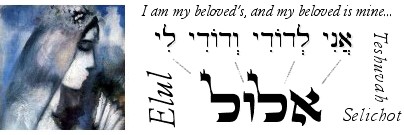 |
Note that the word "Elul" (אֱלוּל) may be read as an acronym for the phrase,
ani le'dodi ve'dodi li (אֲנִי לְדוֹדִי וְדוֹדִי לִי), "I am my beloved's, and my beloved in mine"
(Song 6:3), to encourage to become full of desire for the Beloved of our soul...
Shuvah Yisrael ad Adonai Elohekha: "Return, O Israel, to the LORD your God..." (Hos. 14:1). The sages say you must return to the place where the LORD is your God -- that you receive his acceptance and love, and that you reclaim your status as his beloved child...
The following Hebrew blessing can be recited to ask the LORD to help you prepare for the month of Elul and the forty day "Season of Repentance":
יְהִי רָצוֹן מִלְּפָנֵיךָ יהוה אֱלהֵינוּ
וֵאלהֵי אֲבוֹתֵינוּ שֶׁתְּחַדֵּשׁ עָלֵינוּ חדֶשׁ טוֹב
בַּאֲדנֵינוּ יֵשׁוּעַ הַמָּשִׁיחַ אָמֵן
ye·hee · rah·tzohn · meel·fah·ney·kha · Adonai · E·lo·hey·noo
vei·loh·hey · a·voh·tey·noo · she·te·kha·deish · ah·ley·noo · khoh·desh· tohv
ba'a·doh·ney·noo · Ye·shoo·a' · ha·mah·shee·akh · a·mein

"May it be Your will, LORD our God and God of our fathers,
that you renew for us a good month in our Lord Yeshua the Messiah. Amen."

Download Study Card
Parashat Re'eh - ראה

08.05.18 (Av 24, 5778) Our Torah portion this week (i.e., parashat Re'eh) begins, "See (רְאֵה), I give before you today a blessing and a curse: the blessing (הַבְּרָכָה), if you obey the commandments of the LORD your God, which I command you today, and the curse (הַקְּלָלָה), if you ... turn aside from the way that I am commanding you today, to go after other gods that you have not known" (Deut. 11:26-28). We obtain God's blessing (i.e., berakhah: בְּרָכָה) when we obey the LORD, and our decision to obey manifests the blessed state of walking before the Divine Presence (the direct object marker et (את) before the word "the blessing" alludes to the blessings of "Aleph to Tav," that is from Yeshua, as described in Lev. 26:3-13). As King David said, "I have set (שִׁוִּיתִי) the LORD always before me..." (Psalm 16:8). David made a choice to "set" the LORD before his eyes, for he understood that opening his eyes to Reality was the only path of real blessing.
On the other hand, we obtain God's curse (i.e., kelalah: קְלָלָה) when we close our eyes and "forget" that the LORD is always present.... Suppressing God's truth invariably leads to idolatry, that is, to self exaltation. Note that the root word for the word "curse" (kalal) means to be treated as of little account, and therefore "ratifies" the rebellious heart's attitude toward God. This is middah keneged middah - we are ignored by the LORD as we ignore Him, just as we seen by Him when we truly seek His face (Isa. 55:6-7). So we see that the blessing or the curse really comes from our own inward decision, and God establishes the path we have chosen. As King David said, "God supports my lot" (Psalm 16:5), and Solomon wrote, "The heart of man plans his way, but the LORD directs his steps" (Prov. 16:9).
Note: The third of the "Seven Weeks of Comfort" leading up to Rosh Hashanah is called Aniyah so'arah (עֲנִיָּה סעֲרָה, "O afflicted and storm-tossed one"), which reminds the Jewish people of God's eternal and unconditional covenant of peace. Indeed of the Jewish people it is said, "no weapon that is fashioned against you shall succeed, and you shall refute every tongue that rises against you in judgment." Therefore the LORD invites the people to drink freely from the waters of life: "Incline your ear, and come to me; hear, that your soul may live; and I will make with you an everlasting covenant (בְּרִית עוֹלָם), my steadfast, sure love for David (Isa. 55:3; Luke 1:68-75; Acts 13:34). Note further, however, that since this Sabbath occurs on the New Moon of Elul, a different haftarah is read (i.e., Isa. 66:1-24).
Sorrowful yet Rejoicing...

08.03.18 (Av 22, 5778) It is written that "a joyful heart (לֵב שָׂמֵחַ) is good medicine" (Prov. 17:22). Where it says, "Serve the LORD with gladness" (Psalm 100:2), the sages note that "with gladness" (בְּשִׂמְחָה) contains the same letters as the word "thought" (מַחֲשָׁבָה), which suggests that happiness is found by thinking worthy thoughts. As the apostle admonished: "Think on these things" (Phil. 4:8). We find spiritual happiness when we choose to be thankful. This is called hakarat tovah (הַכָּרַת טוֹבָה), a phrase that means recognizing or being aware of the good. Cultivate a sense of wonder. Look at the sky often, for it is the "daily bread of the eyes." Albert Einstein once said, "There are two ways to live your life; one is as though nothing is a miracle, and the other is as though everything is." Happiness is a choice, a decision to see the good, to open your eyes to wonder, and to turn away from negative, fearful visions. The Torah of the LORD rejoices the heart (Psalm 19:8); let the heart of those who seek the LORD be glad (Psalm 105:3). Shabbat shalom, chaverim!
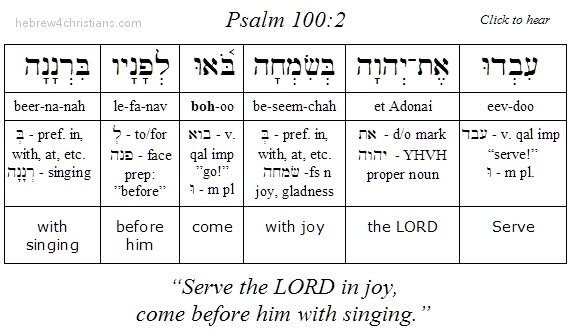 |
The Whole Commandment...

[ The following is related to our Torah reading for this week, parashat Eikev.... ]
08.03.18 (Av 22, 5778) "The whole commandment that I am commanding you this day you shall observe and do, so that you may live..." (Deut. 8:1). The Hebrew phrase kol ha'mitzvah (כָּל־הַמִּצְוָה), here translated as "the whole commandment," refers to the heart attitude, or the inner passion of the soul. Some have linked the word "commandment" (מִצְוָה) with the word "connection" (צוותא), suggesting that God's commandments are the means by which we cleave to Him, as is written: "this is the love of God (אַהֲבַת אֱלהִים), that we keep his commandments" (1 John 5:3). The commandments are "for life" (Lev. 18:5), which means they serve as the call of the Beloved to rise to something far greater...
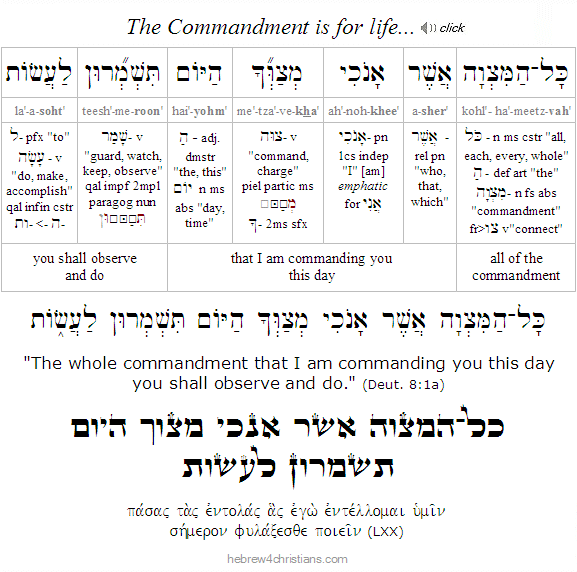 |
The "Whole Commandment" is to walk in God's love. As it is written, tamim yiyeh im Adonai Elohekha: "You shall be wholehearted with the LORD your God" (Deut. 18:13), and "Fear God and keep his commandments - כִּי־זֶה כָּל־הָאָדָם - for this is the whole man" (Eccl. 12:13).
The Kotzker once said, "The prohibition against making idols includes the prohibition against making idols out of the commandments. We should never imagine that the whole purpose of the Torah is its outer form, but rather the inward meaning." Indeed, sacrificial blood was placed over the tablets of the law (i.e., the blood sprinkled on the kapporet, or the "crown" of the Ark) that represented God's forgiveness and atonement for sin. The life is "in the blood," which represents God's passion, the deepest truth of Torah. And this is the message of the gospel itself, of course, since the blood of Yeshua passionately shed for our sake has opened up a new and everlasting way for us to be rightly related to God (Heb. 9:12).
Turning from the Beginning...

08.03.18 (Av 22, 5778) The Jewish sages say that teshuvah (return) was created before the world itself, as it says, "Before the mountains were born, or you brought the world into being, you were the Eternal God who says "Return (שׁוּבוּ), O sons of man" (Psalm 90:2-3). There is a deeper blessing that preceded our exile, friends... The Lamb of God was slain from the foundation of the world, and God clothed humanity in divine sacrifice from the very beginning (Gen. 3:15,21; Rev. 13:8). The water of life (מַיִם חַיִּים) flows from the original orchard of Eden to the world to come (Gen. 2:10; Rev. 22:1). The LORD subjected creation to vanity for the sake of hope (Rom. 8:20), for the revelation of his greatness, as he descended into its depths to return and restore all things to himself. God decreed to enter space-time as the Son of Man, the "Second Adam," to become our Savior and healer. He came to reveal the face of God to us (2 Cor. 4:6). Yeshua "descended in order to ascend;" we are able to know God's compassion, love and healing through his mesirat nefesh – his total sacrifice of body and soul – for the sake of returning us to God.
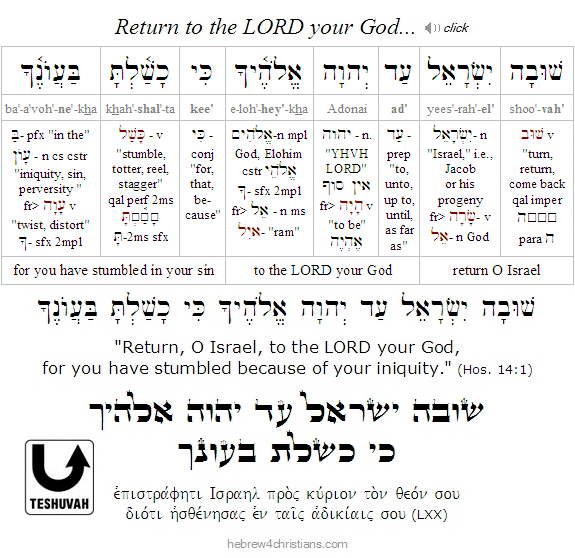 |
The Ineffable Name of God...

08.03.18 (Av 22, 5778) The "tetragrammaton," or the four-letter name YHVH (יהוה), is regarded as God's "proper name" in the Scriptures, though it is better to understand it as a metaphorical term (paronomasia) that points to God's ineffable and infinite essence (אין סוף). This is clearly taught in Torah. For instance when Moses asked for God's Name, God replied, ehyeh asher ehyeh (אֶהְיֶה אֲשֶׁר אֶהְיֶה), "I AM that I AM" (or "I will be what I will be"), abbreviated simply as ehyeh (אֶהְיֶה), "I AM" (Exod. 3:14). Note that God identified himself with Being itself, since ehyeh is the Qal imperfect form of the verb hayah (הָיָה), meaning "to be." Indeed, the Name YHVH (יהוה) essentially means the "Eternal Presence," since God is called ha'hoveh, ve'hayah, ve'yavo (הַהוֶה וְהָיָה וְיָבוֹא) - "the One who is, and was, and is to come" (Rev. 4:8). This "threefold Name" of the LORD of Hosts encompasses all possible states of being, indicating that God is LORD over all possible worlds... Amen. God's power and understanding are infinite (Psalm 147:5) and his Name is a mystery: "His eyes are like a flame of fire, and on his head are many crowns, and he has a name written that no one knows but himself" (Rev. 19:12). So while the Scripture indeed states "the LORD is your name forever" (יהוה שִׁמְךָ לְעוֹלָם), the Hebrew can be read, "the LORD is your name for the world (i.e., לְעוֹלָם), indicating that it is a name accommodated for the language of mankind. Indeed the philosophical idea of a "name" implies "substance" and a definable essence, but the LORD transcends logical analysis and taxonomies. In this connection note that Yeshua taught us to simply regard God as "Abba," our Heavenly Father, likening the Infinite Mystery of Reality to that of a personal and loving providence. The LORD God is both "transcendent," that is, high above all we can ever fully know or describe, but He is also "immanent," that is, as close as our hearts and the breath from our lips (see Deut. 30:14). God's unsearchable greatness, power, and love extend to every possible world, unto the "breadth and length and height and depth" of all that exists, and that includes the inner recesses of your heart...
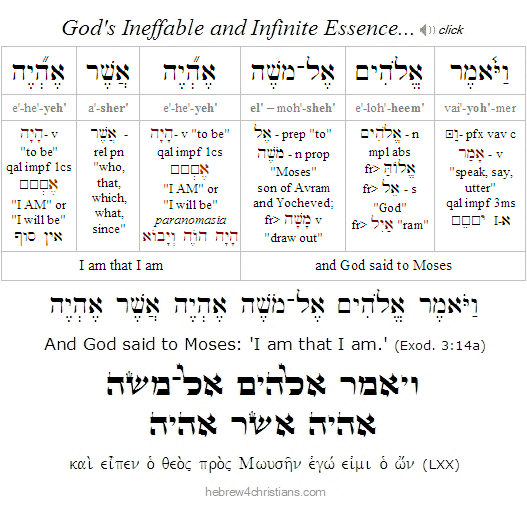 |
There are two places in the Torah when God explicitly revealed the meaning of the name YHVH (יהוה) to Moses. Both occurred at Sinai. The first occurred at the outset of Moses' ministry (at the burning bush when he was commissioned to be Israel's deliverer), and the second occurred after incident of the Golden Calf during the time of the revelation of the law at Sinai. It was only after Moses despaired and confessed the people's need for salvation that the LORD instructed him to meet him again at a place (i.e., makom: מָקוֹם) on the top of Sinai, where He would descend in the cloud to "declare His Name" (Exod. 33:17-34:7). This dramatic experience of revelation was later called middot ha-rachamim, or the revelation of the attributes of God's mercy, which prefigured the New Covenant...
Of the thirteen attributes that defined the meaning of YHVH as our merciful Savior, two are joined together. The LORD is rav chesed ve-emet (רַב־חֶסֶד וֶאֱמֶת), "abundant in lovingkindness and truth," indicating that his love is always a part of reality... In other words, just as God's Name means "presence" and "breath," it also means "compassion" and "love." As Yeshua said: "I am the Aleph and the Tav," says the LORD God (יְהוָה אֱלהִים), "the One who is and who was and who is to come, the Lord of Hosts (יְהוָה צְבָאוֹת)." Yeshua is the revelation of the Name of God, YHVH clothed in the flesh. As he testified to the Jewish people: "Most assuredly I say to you, before Abraham was, ehyeh: I AM" (John 8:58).
The sages ask: "Why is the Name of the Holy Blessed One called ehyeh asher ehyeh (אֶהְיֶה אֲשֶׁר אֶהְיֶה), 'I Am who I Am' (Exod. 3:14)? When one is remorseful and says, "I will return to the LORD and forsake my sin," the Blessed Holy One responds at that instant, saying 'I Am with you and will immerse you in my Presence' (Yitzchak of Peshischa). Indeed, God is our refuge and strength, our ever-present help (Psalm 46:1).
Note: Some people object to the name "Jesus," claiming that it has pagan (or "Zeus") connotations. However, there is absolutely nothing misleading about the name Jesus, even though it is a Latin transliteration (i.e., IESUS) derived from the Greek transliteration (Ιησοῦς) of the original Hebrew, which later appears in its shortened form as Yeshua (e.g., 1 Chron. 24:11; Neh. 8:17). Note that the name Yehoshua comes from the verb יָשַׁע, "to save," and יה, a shortened form of YHVH, and therefore means "the LORD saves." According to the late Dr. David Flusser, Professor of Early Christianity and Judaism of the Second Temple Period at the Hebrew University of Jerusalem, "Yeshua" was the third most popular male name during the time of the Second Temple period. For more see the Names of G-d section of this website.
Remember all the way...

08.02.18 (Av 21, 5778) From our Torah reading this week (i.e., parashat Eikev) it is written: "Remember all the way (וְזָכַרְתָּ אֶת־כָּל־הַדֶּרֶךְ) that the Lord your God has led you..." (Deut. 8:2). We learn what is in our hearts by being tested in the dry places. "From the day you left Egypt... you have been rebellious against God" (Deut. 9:7). Moses' rebuke was meant to awaken the people, to encourage them to search their hearts and confess who they were. Self-examination is essential for us to return to God, for otherwise we continue the cycle of pride-shame that binds us. We can't learn to walk as children of God until we are free of the need to defend ourselves. We come to the cross "just as we are," full of brokenness and need, confessing "salvation is of the LORD." Ve'zakharta et kol ha'derekh - remember this "all the way" of our sojourn... God knows the whole way that you have come, and he is refining your heart for your ultimate good (Jer. 29:11).
First Word of Revelation...

08.02.18 (Av 21, 5778) The Ten Commandments were given in the singular, not in the plural: "I AM the LORD your (singular) God" – to emphasize that each person must hear the message and receive it for themselves. Read and understand the statement: "I AM the LORD your God" (אָנכִי יְהוָה אֱלהֶיךָ) as the starting point of all Torah, the very first commandment, and the foundation for all that follows. Revelation begins with the apprehension of "I AM" for you – I AM your God who brings you out of slavery to your fear and your captivity to vanity. When you receive the Torah of "I AM the LORD your God," you are made a child of eternal promise, and even if heaven and earth should melt away in fervent heat, nothing can keep you from the care of your heavenly Father (Rom. 8:31-39). Perfect love casts out fear. Make yourself bold, then, to receive God's love for your soul. Abide in God's love; make it your own. Loving God is the beginning and end of all of reality.
The Test of Love...

[ The following entry uses Koine Greek; please skip it if you do not find it helpful... ]
08.02.18 (Av 21, 5778) Saying that "God is love" is not to say that "Love is God," and indeed the statement "God is love" should not be understood to express equivalence between the terms. But why is this important? Because there are some who falsely teach that "God is love" means "Love is God" which implies that whatever people may love or want – for instance a good friend, an exciting romance, a beautiful sunset, some stirring poetry or music, a pleasurable meal, and so on – may be regarded as a supposed revelation or "epiphany" of God. It should be evident, however, that the mere elevation of human yearning, even if worthy, is not what the Apostle meant when he said that "God is love."
 |
The statement "God is love" (i.e., ὁ θεὸς ἀγάπη ἐστίν) occurs only 1 John 4:8 and 4:16, and in both cases is written with the word "God" having the definite article (i.e., ὁ θεὸς) but the word "love" is without the article (i.e., ἀγάπη), which is a grammatical construction that indicates the two words are not interchangeable. The definite article used with "God" denotes that the God of Israel is the subject whereas the predicate noun "love" indicates an essential or necessary quality of the subject. In light of this we can translate "God is love" as "God in his very being, essence, and nature is love." However it must be stressed here that what John means by love (i.e., agape) can only be understood in context and by noting how he used this word in his other writings, particularly in the gospel he wrote and in the revelation of God's passion demonstrated at the cross where Yeshua became our "propitiation" (ἱλασμός) or atonement (kapparah) for our sins (1 John 4:10; John 3:16).
We are given the imperative to love as God loves us (John 13:34, 15:12; Eph. 5:1-2), though the ability to do so is a miracle generated within the heart of faith. Therefore John says that love is "from God" (ἐκ τοῦ θεοῦ) and is a result of God's direct intervention: "Love is from God, and everyone who loves has been born of God and knows God" (1 John 4:7). "We love because he first loved us" (1 John 4:19). The presence and practice of love, then, is the consummate test for the existence of genuine faith. Faith without love is dead, and the person devoid of the miracle of a regenerated heart frankly does not know God (ὁ μὴ ἀγαπῶν οὐκ ἔγνω τὸν θεόν) because God's nature is love itself. Faith and love and therefore inextricably linked, and the failure to love indicates the absence of true faith (1 John 4:20). In this connection it has rightly been said that "lovelessness is godlessness."
To know God in the truth, then, is to be impelled or constrained to love as God loves. The law of God is love, just as love is the fulfillment of the law (Rom. 13:8,10; Mark 12:29-31). The "heart of the law" is the love, just as the "law of love" is the heart of the gospel (John 15:12). Practically speaking this love is expressed in the earnest desire to please God and to obey his commandments (John 14:15, 21; 1 John 2:5-6; 3:4-7; 1 John 5:3, etc.). The agency of the Holy Spirit enables the "will to love" as the heart surrenders to God's love in Messiah.
Some people claim that all religions amount to the same thing – namely the duty to love – but this superficial assertion is based on ignorance rather than empirical study of the teachings of the various world religions (including secular religions). The love that the apostle John speaks of is rooted in the historical reality of Yeshua, the Messiah of Israel. "By this the love of God is revealed in us: that God has sent his one and only Son (בֵּן יָחִיד) into the world so that we may find life through him. In this is the love (ἐν τούτῳ ἐστὶν ἡ ἀγάπη): not that we have loved God, but that he loved us and sent his Son to be the atoning sacrifice (i.e., kapparah: כַּפָּרָה) for our sins" (1 John 4:9). These are matters of life and death friends, and nothing is more exitentially relevant to us than the question of whether we truly know the love of God... Our salvation, our eternal welfare, and the very destiny of our lives depends on settling the issue. ὁ ἔχων τὸν υἱὸν ἔχει τὴν ζωήν· ὁ μὴ ἔχων τὸν υἱὸν τοῦ θεοῦ τὴν ζωὴν οὐκ ἔχει: "Whoever has the Son has the life of God; whoever does not have the Son of God does not have the life" (1 John 5:12).
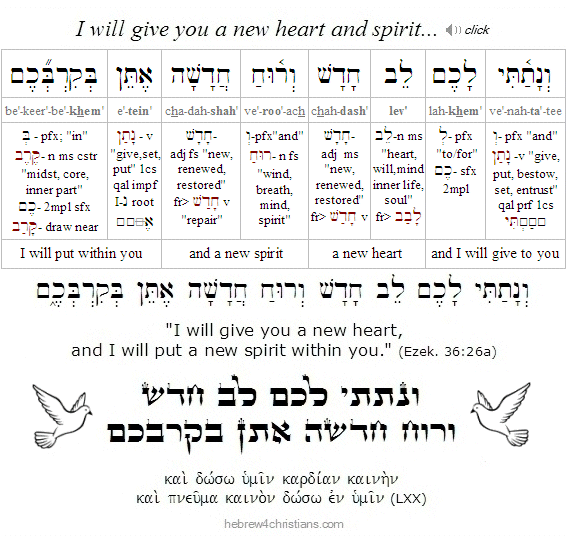 |
Outsiders with Him...
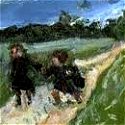
08.01.18 (Av 20, 5778) "Hear my prayer, O LORD, and give ear to my cry; hold not your peace at my tears! For I am an outsider with you, a temporary resident, like all my fathers" (Psalm 39:12). The righteous regard themselves as outsiders (i.e., gerim: גֵּרִים) in this world, temporary residents (i.e., toshavim: תּוֹשָׁבִים) on their way to the world to come (Heb. 13:14), while the wicked regard this world as the only (or all-consuming) reality, and therefore they cling, demand their place here, and live entirely for its momentary pleasures. In light of this, it has truly been said that God 'settles' among those who are strangers in this world, but makes himself "strange" to those who 'settle' here... And may it please the LORD our God to give us the blessing of dissatisfaction with this world and its trinkets, and an abiding and all-consuming desire to be home with Him. Amen.
שִׁמְעָה־תְפִלָּתִי יְהוָה וְשַׁוְעָתִי הַאֲזינָה
אֶל־דִּמְעָתִי אַל־תֶּחֱרַשׁ כִּי גֵר אָנכִי עִמָּךְ
תּוֹשָׁב כְּכָל־אֲבוֹתָי
shim·ah · te·fil·la·ti · Adonai · ve·shav·a·ti · ha·a·zi·nah
el · dim·a·ti · al · te·che·rash · ki · ger · a·no·khi · i·makh
to·shav · ke·khol · a·vo·tai

"Hear my prayer, O LORD, and give ear to my cry;
hold not your peace at my tears! For I am an outsider with you,
a temporary resident, like all my fathers."
(Psalm 39:12)

Hebrew Study Card
Keep moving toward the Heavenly City, friends... Do not give up hope. "I am sure of this, that he who began a good work in you will bring it to completion (ἐπιτελέω) at the Day of Yeshua the Messiah" (Phil 1:6). The LORD is able to guard you (φυλάξαι) from stumbling and to present you blameless before the presence of His glory with great joy (Jude 1:24). "He will preserve you (βεβαιόω) to the end, guiltless in the Day of our Yeshua the Messiah" (1 Cor. 1:8). He who calls you is faithful; He will surely do it (1 Thess. 5:24). "The Lord is faithful (נֶאֱמָן הוּא): He will establish you and guard you against the evil one" (2 Thess. 3:3).
Gratitude and Seeing...

08.01.18 (Av 20, 5778) From our Torah this week (i.e., parashat Eikev) we read: "And you shall bless the LORD your God for the good..." (Deut. 8:10). Whenever we derive benefit or enjoyment from something we are to bless (i.e., thank) God for his goodness. Indeed the Hebrew term for gratitude is hakarat tovah (הַכָּרַת טוֹבָה), a phrase that means "recognizing the good." The heart looks through the eye, and therefore how we see is ultimately a spiritual decision: "If your eye is "single" (i.e., ἁπλοῦς, sincere, focused)," Yeshua said, "your whole body will be filled with light" (Matt. 6:22). When we see rightly, we are awakened to God's Presence in the little things of life, those small miracles and "signs and wonders" that constantly surround us. The good eye of faith sees hundreds of reasons to bless God for the gift of life (1 Cor. 10:31). The LORD is "enthroned among the blessings of His people" (Psalm 22:3).
The thank offering mentioned in the Torah (i.e., zevach ha-todah: זֶבַח הַתּוֹדָד) reappears in the New Testament. In the Book of Hebrews were are instructed to "continually offer up a sacrifice of thanks (זֶבַח תּוֹדָה) to God, that is, the fruit of lips that acknowledge his Name" (Heb. 13:15). It is interesting to note that the Greek verb used to "offer up" (i.e., ἀναφέρω) is used to translate the Hebrew verb "to draw near" (karov) in Leviticus. In other words, the "offering up of thanks" for the sacrifice of Yeshua functions as "korban" and draws us near to God. Thanking God for personal deliverance constitutes "right sacrifices" (זִבְחֵי־צֶדֶק) as we draw near to God in the hope of His love (Psalm 4:5; Heb. 7:19).
"Give thanks to the LORD for He is good; his love endures forever" (Psalm 136:1); "give thanks to the LORD always" (Col. 3:17; Eph. 5:20; 1 Thess. 5:18)... Gratitude is foundational to our lives as followers of Yeshua. Indeed there are really only two prayers we ever offer to God, namely "Help, LORD!" and "Thank you, LORD." Meister Eckhart once remarked that if the only prayer you said in your entire life was, "thank you," that would suffice... Genuine prayer ultimately resolves to an expression of thanks. We are to "praise the Bridge that carries us over" into the Presence and Love of God, and that Bridge is Yeshua our Lord.
|



